To be very clear, not everyone should travel now. You should carefully consider the many risks as we’ve done ourselves, and we made our decision based on the fact we’re comfortable with all those risks.
And I’m considering going back because I might still be comfortable with them. And because there’s once again a lockdown where I live to limit contacts; leaving will reduce my contacts to zero. And I won’t be putting anyone at risk here upon return since there’s a mandatory quarantine (and not putting anyone at risk there either by semi-isolating myseld before our departure and taking all the precautions all the time).
Anyway, in this post, I’ll describe the situation in Turkey like I already did for the week that we spent across the Aegean Sea (what it’s like to travel to Greece during the pandemic).
And as promised, we’ll soon have detailed posts about every element of the travel experience (including the less-than-impressive quarantine process and posts about the destinations themselves).
Overall impressions
Honestly, in Turkey or Greece, the fact is the travel experience itself has not changed very much. We were genuinely surprised by how similar it was to a regular trip, as was the case for the airplane experience and the airport experience.
The preparation, planning, and booking parts of the trip have definitely changed—but once you’re there, not so much. Especially if you stay within one country.
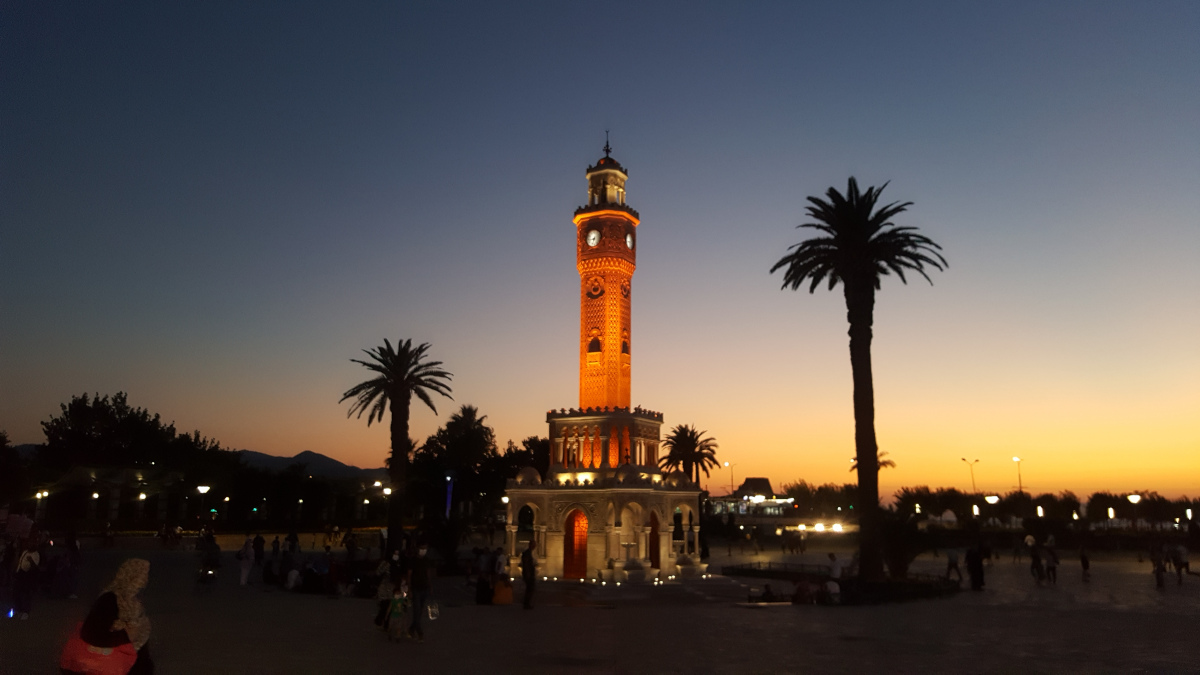
That said, the situation was great when we went… but as it does here, the situation can change very quickly.
We love Turkey; it’s one of our favorite countries in the world even if its leaders are often criticized, the people are so welcoming and nice. And having been there twice each (once together in 2017 and once separately last year), we had better points of comparison than in Greece.
This trip to Turkey was just as enjoyable as our others. And Turkey was just as affordable as it used to be, something that is really great for those who want to travel more.
While infection rates and new cases in Turkey were proportionally higher than in Greece (albeit similar to Canada) based on their official numbers, we personally did not feel like it was not being taken seriously or that we were any more at risk than we were at home since we were taking every precaution, even more than in Canada. Again: obviously this does not mean everyone should travel; it really depends on your own situation (our guide to decide on whether to travel or not can help you).
But it’s outright impossible to have been to Turkey (or Greece) this summer and come back saying something like “the experience was bad, it’s not worth traveling”. Impossible. There are some drawbacks and risks listed in that decision guide that could apply to you, the experience itself honestly not really be an obstacle when a country is no longer in a lockdown (there are already more than enough real obstacles, at least for many travelers).
Travel had definitely restarted in Turkey: the 3 domestic flights we took within the country were full or nearly full, and there were plenty of travelers from other parts of the country and Europe (at least in some regions, since this time around, we didn’t really visit the country’s highlights and most popular destinations).
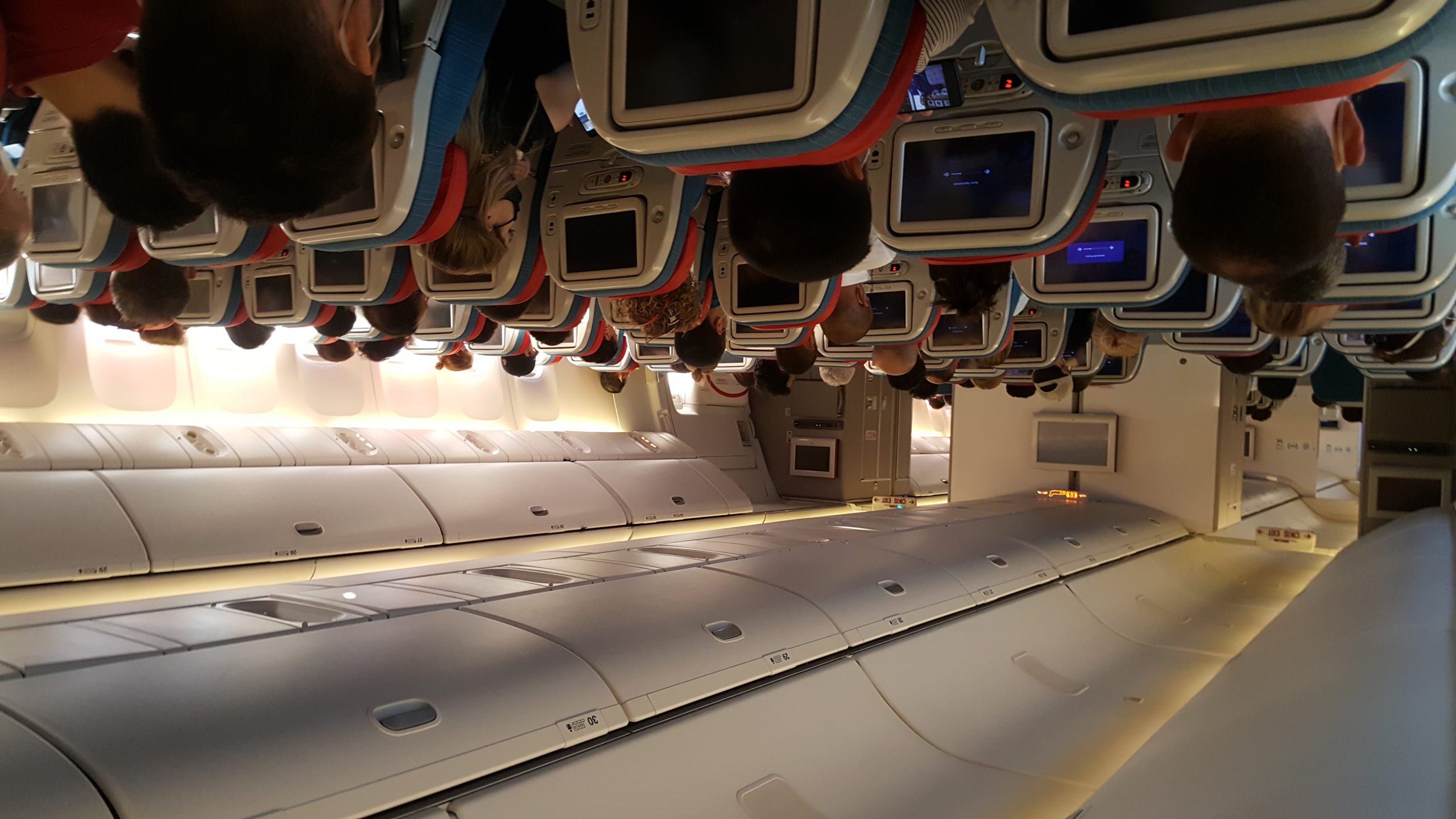
The coronavirus rules were pretty similar to back home, except that, notably, masks were mandatory even outdoors in some provinces.
The country developed a “Certificate of Safe Tourism” that all types of businesses could aim to qualify for, based on specific standards; more below.

So in terms of established protocols, if anything, they were even more thorough than in Greece, with health questionnaires and hygiene standards in lodging and transportation that seemed to be very well-followed.
On the other hand, in terms of distancing and handwashing when entering businesses and restaurants, I would say the people were maybe a bit less mindful of if compared to Greece… only because it was nearly perfect in Greece. But overall, still very good. We’d have no problem going back; we just might do so soon as I said.
Anyway, now let’s get into each aspect of the travel experience.
Here it is in the same order as for Greece.
What is different than pre-pandemic trips
As I just mentioned, not much.
Wearing masks and physical distancing.
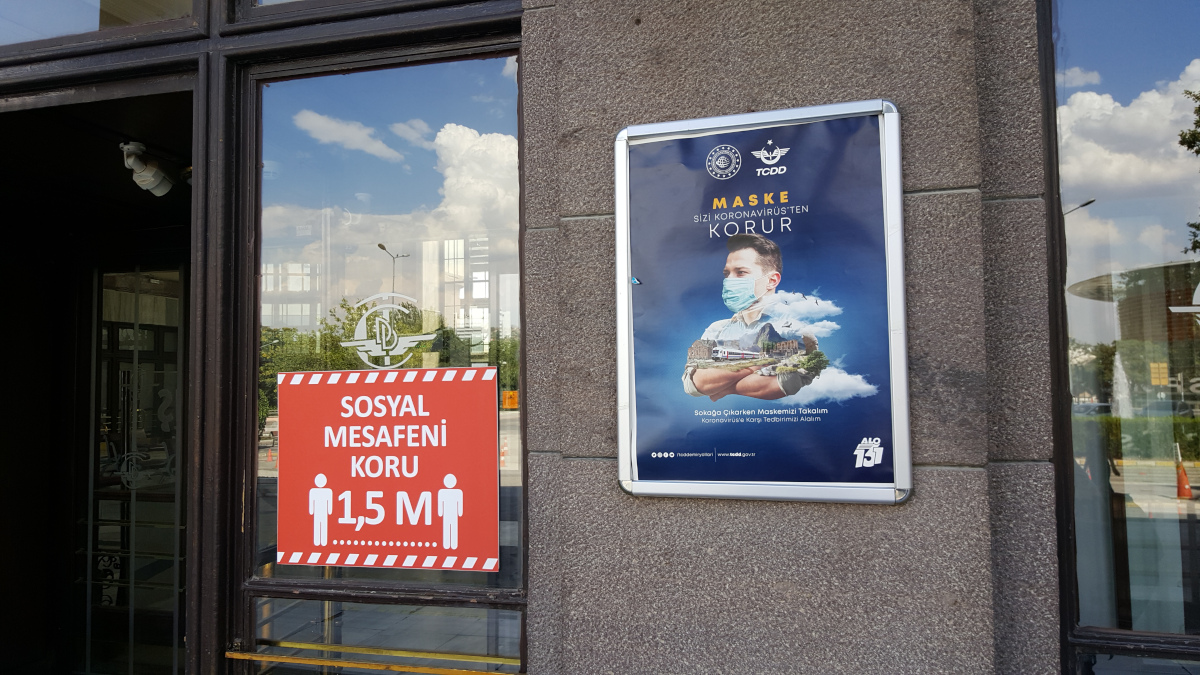
Seriously, apart from the fact that check-in was a bit longer in hotels because of the extra precautions (which particularly affected us since we love changing hotels frequently, especially with the Hilton promo that got us many free hotel nights, which we’ll tell you about in a separate post)…
As you’ll see in each section, I can’t emphasize this enough: not much has changed at all.
What is open in Turkey
Exactly the same answer as for Greece: everything. We did not see a single thing that wasn’t open, including airport lounges, even some that were marked as closed in the Priority Pass app were very much open (thankfully for us).
Lounges aren’t even open in Canada. Because of details like that, just as it is safer (for others) to travel internationally than within Canada (because quarantining upon return means you are not a risk for anyone as opposed to returning from a trip within Canada without quarantining), it’s also arguably more fun to travel internationally too.
As mentioned this week, in over 50% of world countries the pandemic is going better than here already (based on the data: active cases per capita) so if you are comfortable with the other risks and can do the quarantine, the situation elsewhere can be more enjoyable than here. Especially for those in Quebec like us, where we’re now back into a pretty strict lockdown.
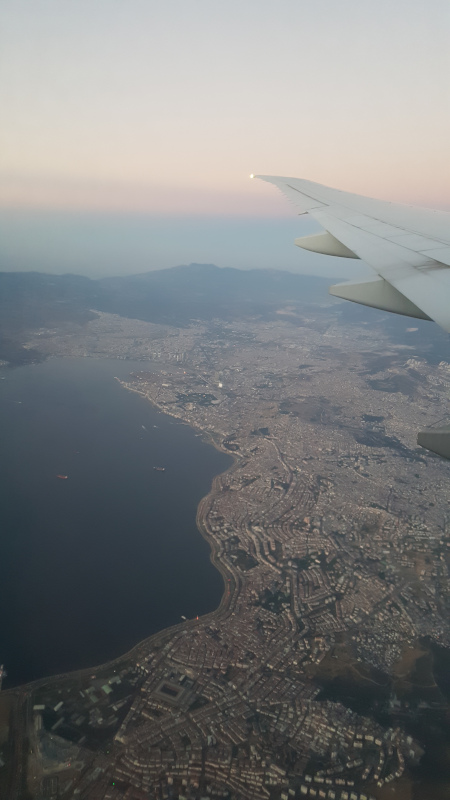
Anyway, in Turkey, everything was open, from the Ephesus UNESCO World Heritage Site to the luxury spa where I got a back massage (for much less than here).
Everywhere, they had the precautions we are now all used to.

Again: if you choose a country where the coronavirus situation is going well enough, chances are almost everything will be open.
But you have to be easygoing enough to be fine with the fact that things can change. That’s true for all travel, not just international travel: as I just said, Quebec is back into lockdown so if you had planned a trip to the province just one week earlier, things have changed. That’s the new reality; you have to stop stressing out about uncertainty if you want to travel.
How welcoming the locals are
Same as Greece: if anything, they were even more welcoming than before, given how few travelers the past months have brought.
Life has almost returned to normal in Turkey despite the coronavirus, and regardless of whether you think that is good or bad, the fact is they were happy to see us travelers.
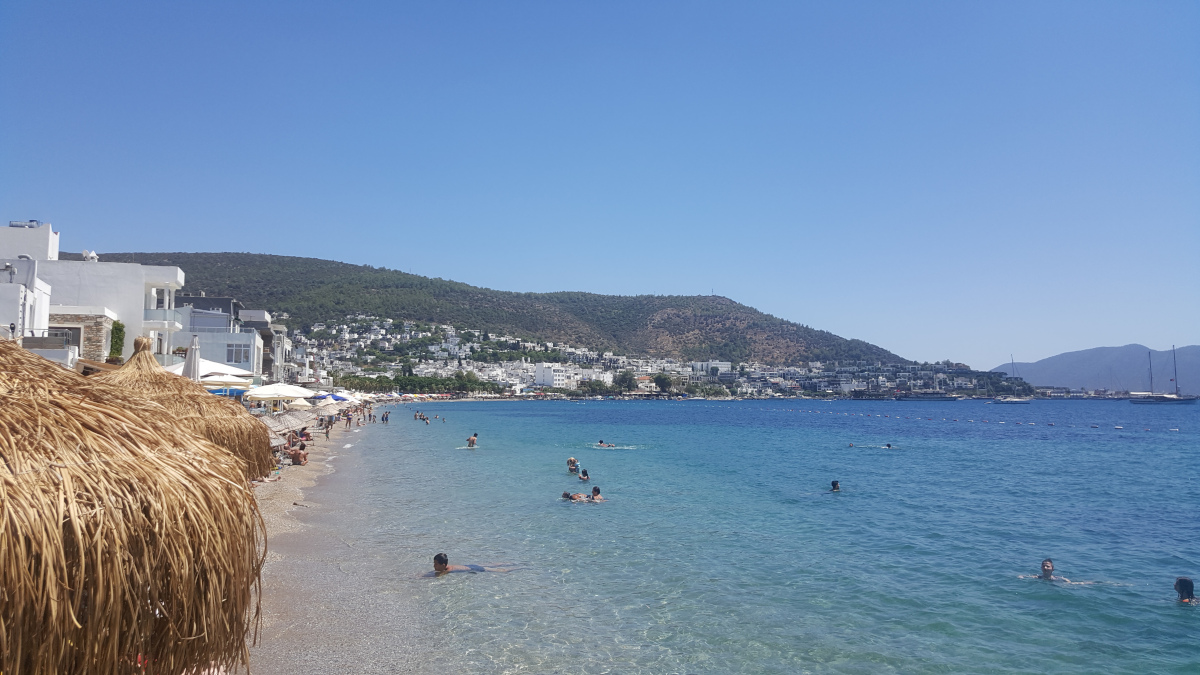
For example, the owner of the hostel where we stayed in Ölüdeniz (our only non-hotel of the Turkey trip) was very glad to see Canadians and went the extra mile by helping us plan out the rest of our itinerary. He also mentioned that it had unsurprisingly been his worst summer ever.
That (the millions of people here in Canada and worldwide whose livelihoods depend on travel—especially in developing countries) is exactly why travel needs to resume safely and responsibly. Starting with the end of the illogical quarantine rule, as we explained before based on facts.
It’s pretty similar to Canada and Greece.
Or even better: temperature checks were performed everywhere (hotels, malls, bus/train stations, airports) which makes it seem even more ridiculous that over 6 months into the pandemic, it has just become mandatory for Canadian airports to do this starting in late September (except for the 4 biggest airports, where it took “only” 4 months).
It’s not that it’s going to solve the whole coronavirus situation… but it’s so simple to put in place that even bus stations in Turkey’s 29th-largest city can do it, but the airports in our federal capital and all but one of our provincial capitals didn’t have to do this for 6 months…
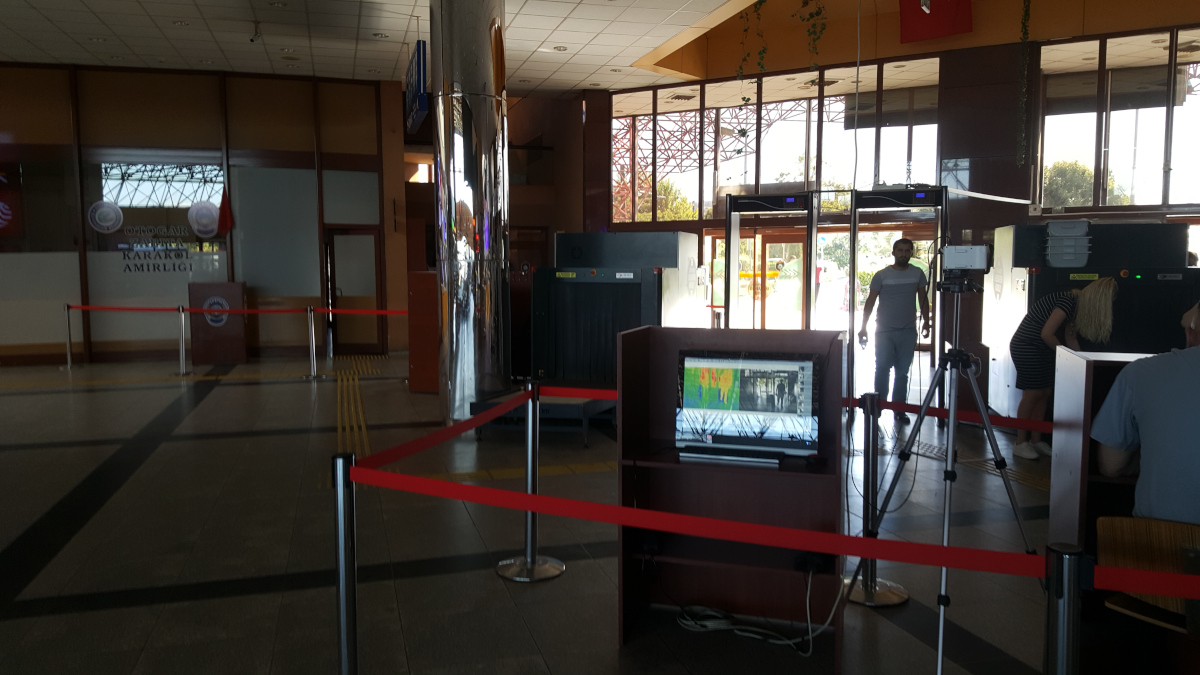
Even a random mall in a relatively small town like Eskişehir had temperature checks at the entrance.
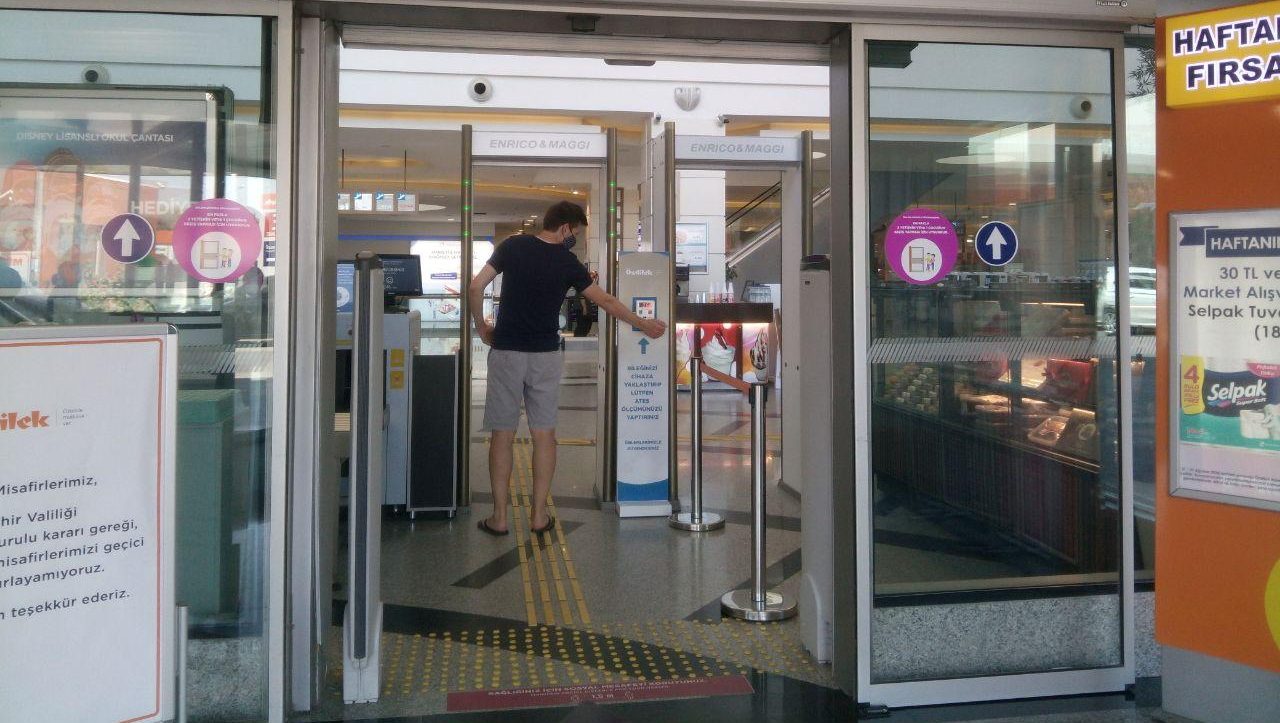
Anyway, there were measures to promote physical distancing everywhere, with signs and markers. And it was mostly adhered to.
In terms of distancing, while it’s 2 meters in Canada, in Turkey it’s 1.5 meters just like in Greece. However, in Turkey we saw both—we even saw 1.8 meters.
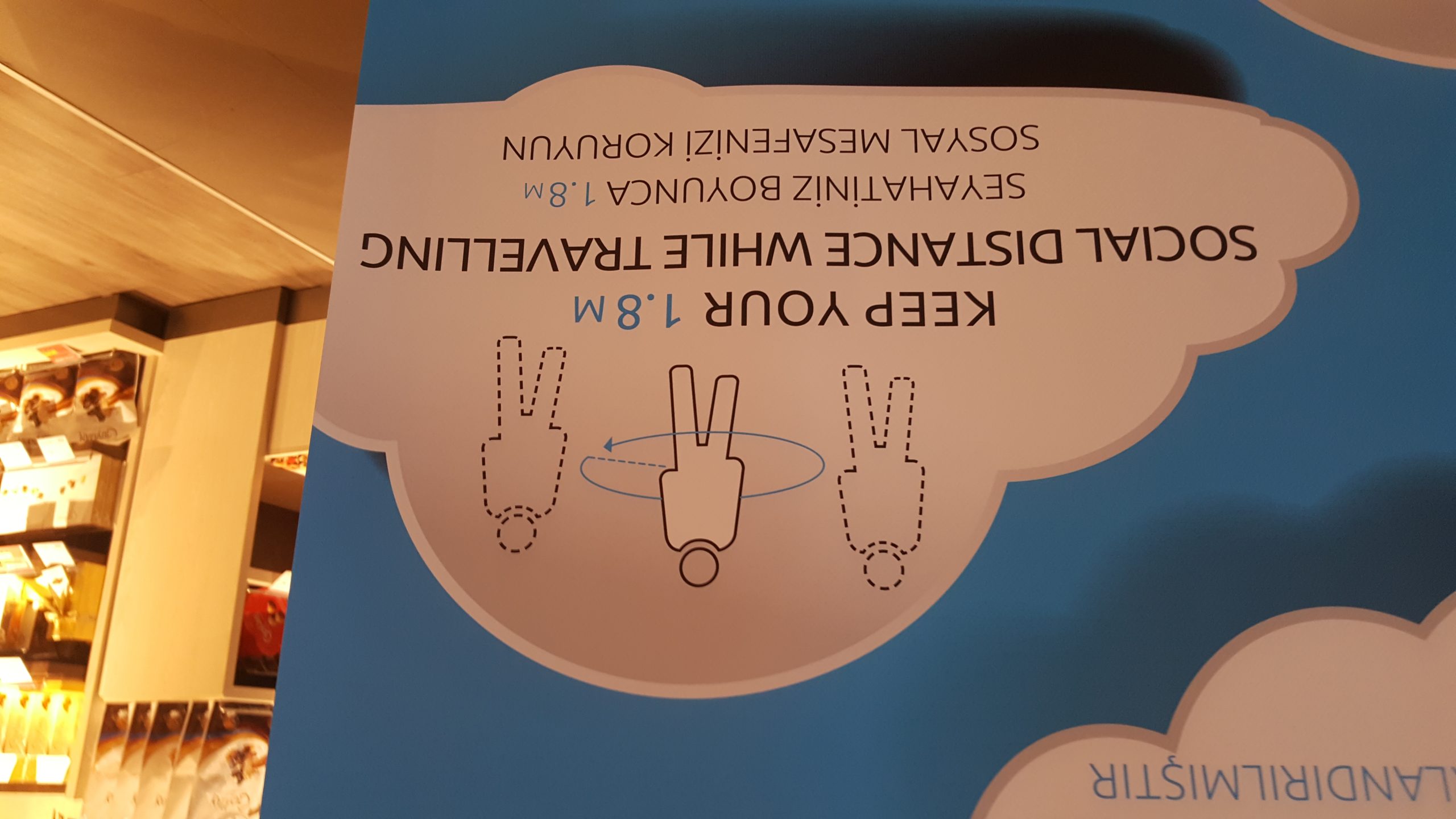
If you think that’s a random number just like the country’s famous 82 kilometers per hour speed limit…
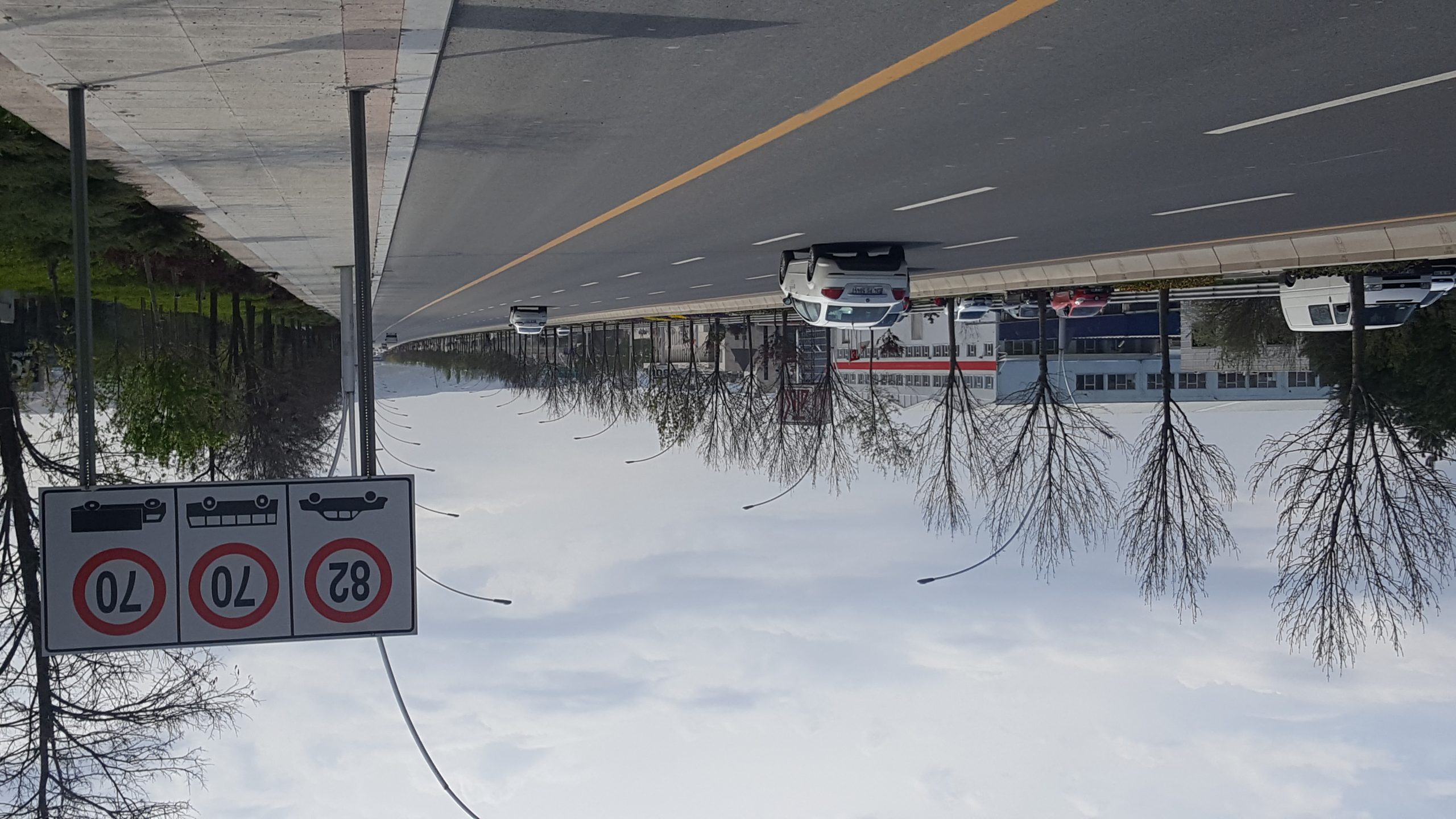
… keep in mind that 1.8 meters happens to be the metric equivalent of 6 feet (but 82 km/h is not the metric equivalent of a nice round miles figure, so that one I can’t quite explain).
That said, it is somewhat strange to see that this distancing recommendation varies around the world. The virus surely doesn’t travel further in Canada than it does in Europe!
Almost all businesses provided hand sanitizer and often it was via a formal standardized dispenser. It started at the airport and it was easy to find them everywhere after too.
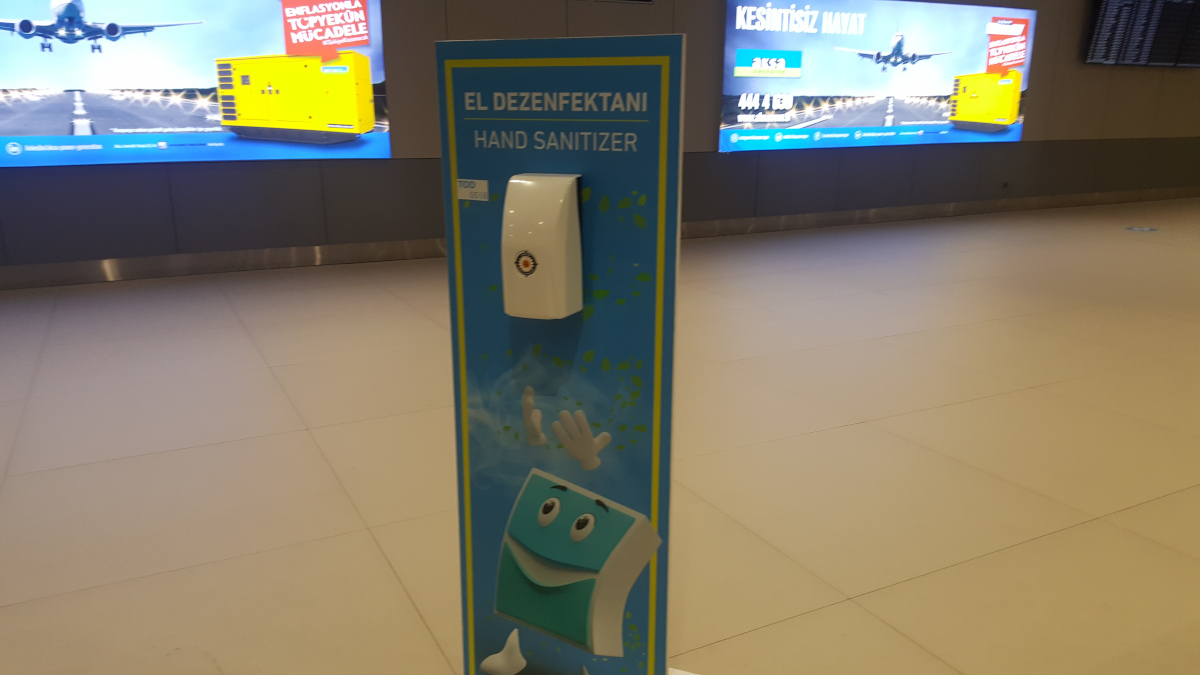
Masks are mandatory indoors, and everyone was following that rule.
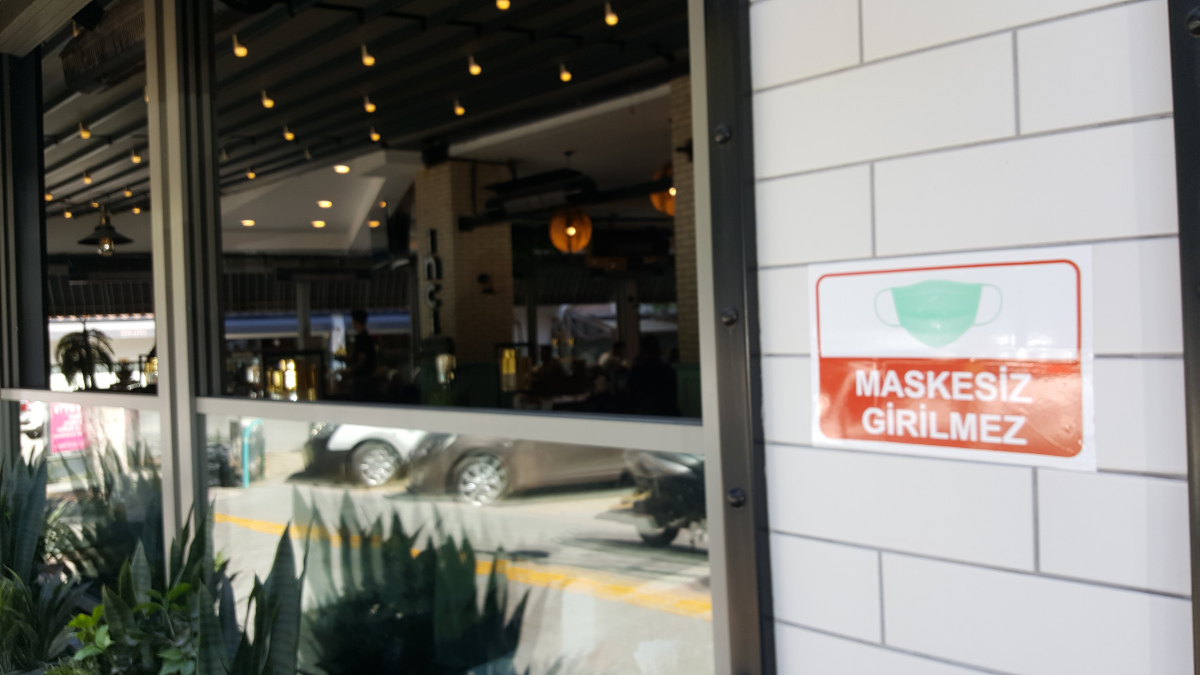
In many Turkish provinces, it went even further and masks were required even outdoors, which was mostly followed (although definitely not 100% like indoors).
Admittedly I haven’t gone out much since March to do my part, but I had never seen mask vending machines in Canada.
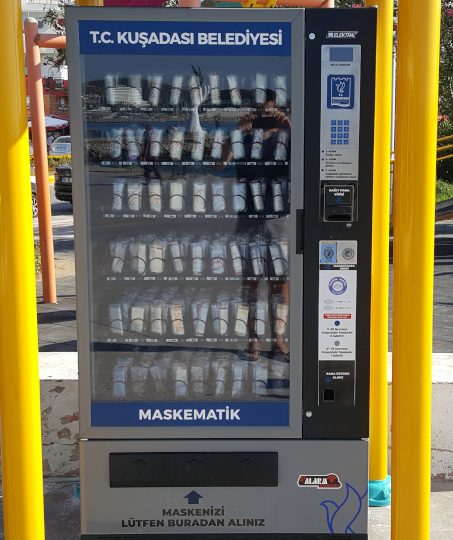
Yes, masks are unpleasant like we already said, but certainly not as unpleasant as not traveling. And certainly not as unpleasant as missing out on trips that you’ll literally never be able to recoup in your lifetime (at least based on the data from our readers who tell us that it is time—and not money—that is their biggest obstacle to traveling more).
That said, we often saw policemen do nothing when crossing paths with some not wearing a mask outdoors, so I’m not sure how enforced the rule is.

But as always, we recommend following all rules and laws. But not necessarily advisories that aren’t binding, an important distinction. Especially when advisories aren’t logical like recommending to avoid all travel to all countries: make your own informed decision by considering every factor thoroughly like a responsible adult (when it’s not a law).
Speaking of the fact that many people have a hard time with non-simplified dumbed-down instructions, Turkey had 14 coronavirus rules posted all over the place. Yes, 14. That seems like a bit much. Not sure many people will read all 14 whether it’s under the hand sanitizer dispenser like this or elsewhere.
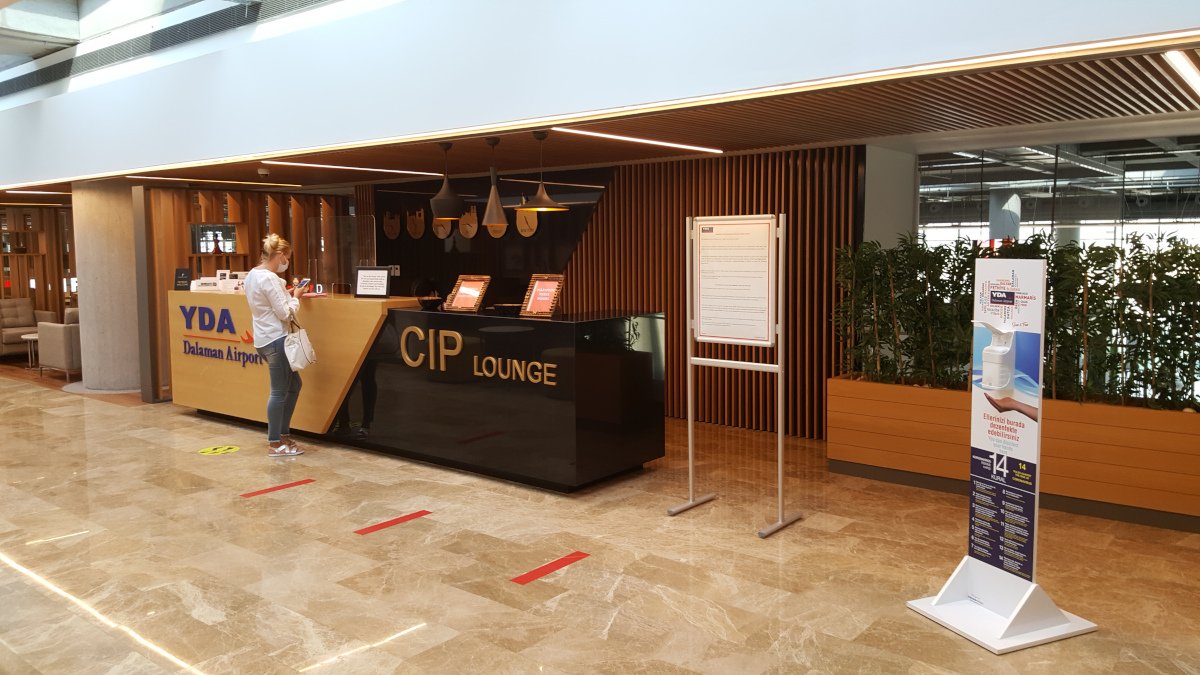
By the way, we’ll soon be sharing our tips specifically about hygiene precautions while traveling, based on our own experience on this trip.
These will be hands-on concrete tips, we obviously won’t tell you about washing your hands frequently. Turkey covered that with handwashing instructions with only 12 steps, which is much more thorough than anything I had seen elsewhere.
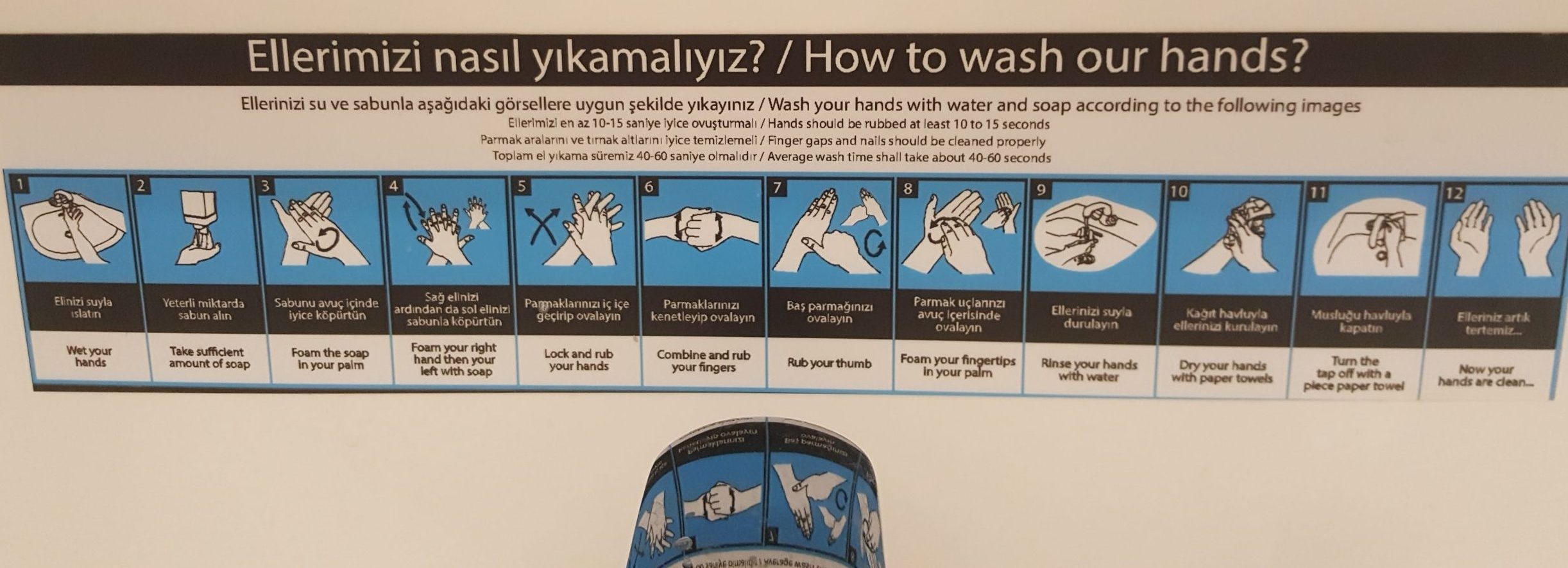
What it’s like to enter Turkey
In Turkey and Greece, there are no tests or anything else required to enter.
In Greece, it took less than 5 minutes from the moment we stepped off the plane to the moment we were outside.
And in Turkey, it probably would have been even quicker… if not for the fact that the glitzy brand-new mega-airport in Istanbul (IST) involves endless walking due to its sheer size.
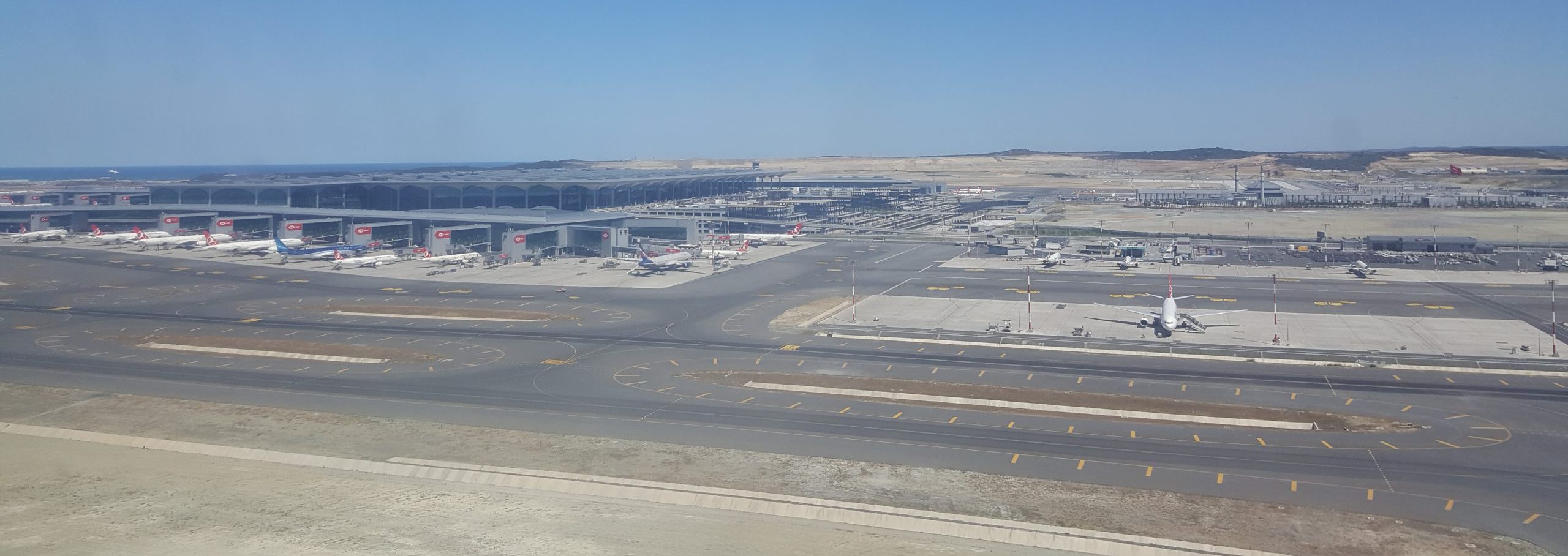
It’s a beautiful, stunning airport, but boy, it is huge.
See the end of the hallway where we have to walk to upon arrival? No? That’s my point.
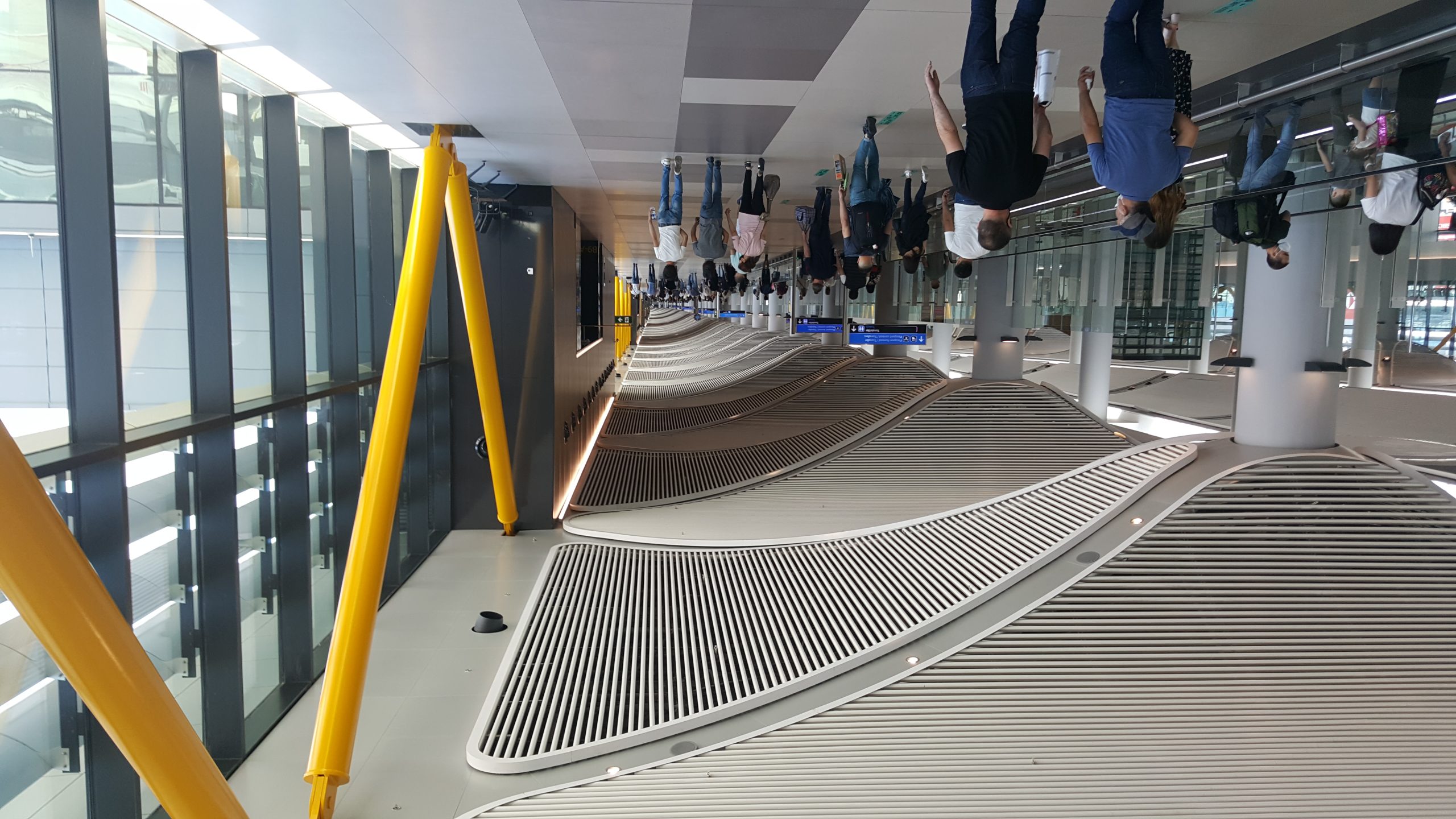
But having entered the country in that airport twice last December, I had a good point of comparison, and essentially nothing has changed.
Turkey has no entry restrictions whatsoever for Canadians. In fact, full disclosure: unlike Greece and most of Europe, Turkey is even open to Americans (one of the few countries that currently are), so if you prefer a country that is being more selective with its entry rules, Turkey is definitely not that place.
And while Greece performs random testing at the airport, there is no such thing in Turkey. There was no form for the coronavirus to fill out in advance (unlike in Greece), just one provided on the plane to indicate where you will be staying that you hand to the passport control officer.
Turkey is unfortunately still a country that requires a visa, but fortunately it is easy since it is still the same electronic visa—that has not changed at all during the pandemic. It is issued instantly online, exactly the same as before.
So not much has changed in terms of entering the country compared to last December, apart from the contactless stations to scan every passenger’s temperature automatically. I assume that like everywhere else, if you were to have a high temperature, you’d have to self-isolate if it doesn’t go away.
What it’s like to fly to (and within) Turkey
I already detailed our long-haul flight experience during the coronavirus pandemic, and apart from the fact that making our way from Greece to Turkey was much more complicated than it would usually have been, the flight experience itself was just as pleasant and safe in these many additional flights.
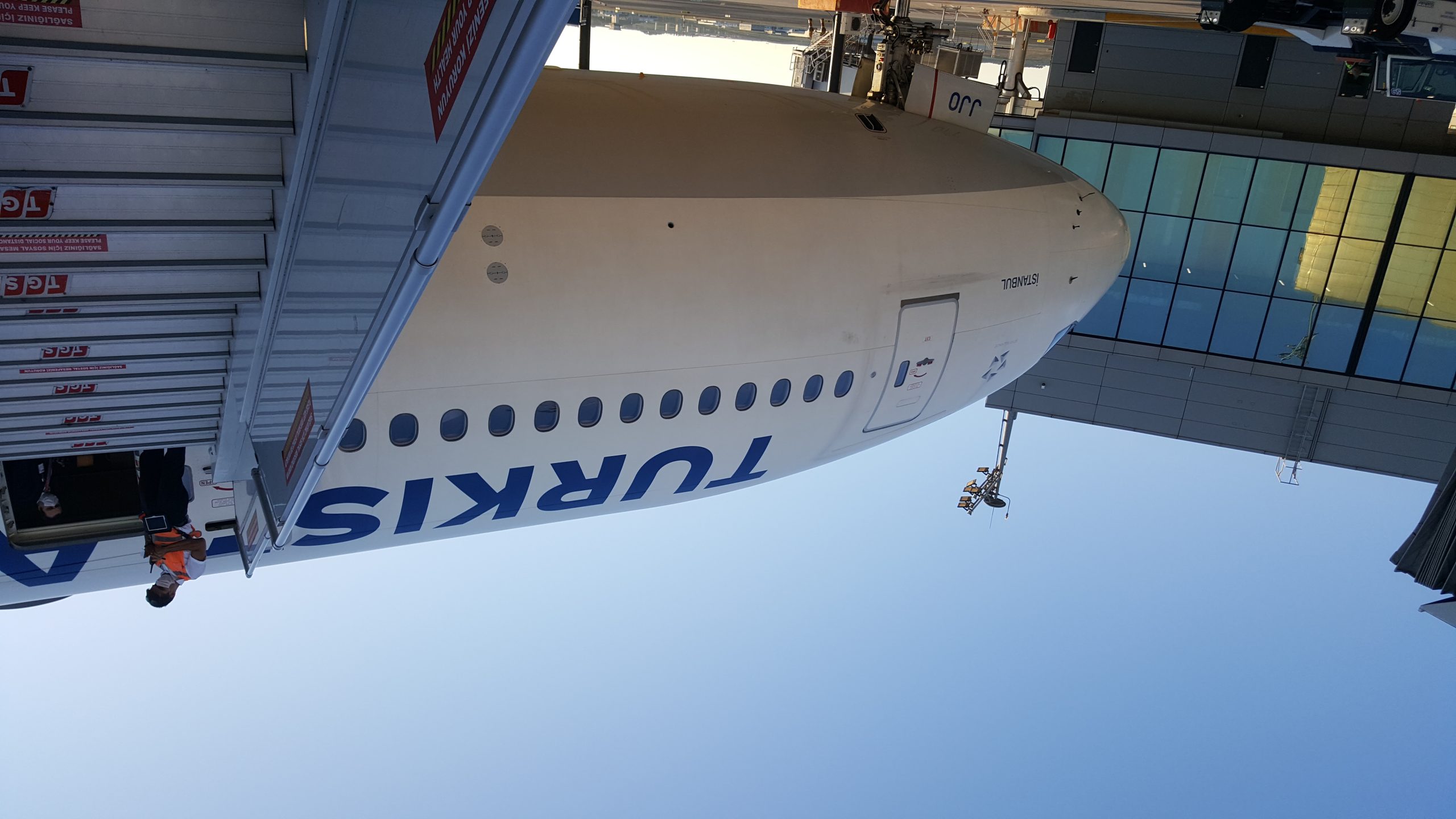
Normally, there are plenty of affordable ferries between Greece and Turkey. As I said with Greece, everything domestic was operating fine (like the many Greek domestic ferries), but a lot of what is international is affected (like the international ferries).
Normally, there are plenty of affordable Athens–Istanbul flights (they are less than C$65), but that direct route was suspended (and it was coronavirus-related, not potential-pandemic-time-war-related).
We were in the Greek islands (almost closer to the Turkish coast than to Athens) and we were headed to the Aegean region of Turkey, which would’ve been a quick and cheap ferry ride in a straight line in normal times. But instead, we had to take a ferry in the wrong direction and 3 flights.
In short, we had to go 500 miles north via Belgrade, Serbia (at least we were able to get a long 19-hour layover in this city we had enjoyed visiting in 2018).
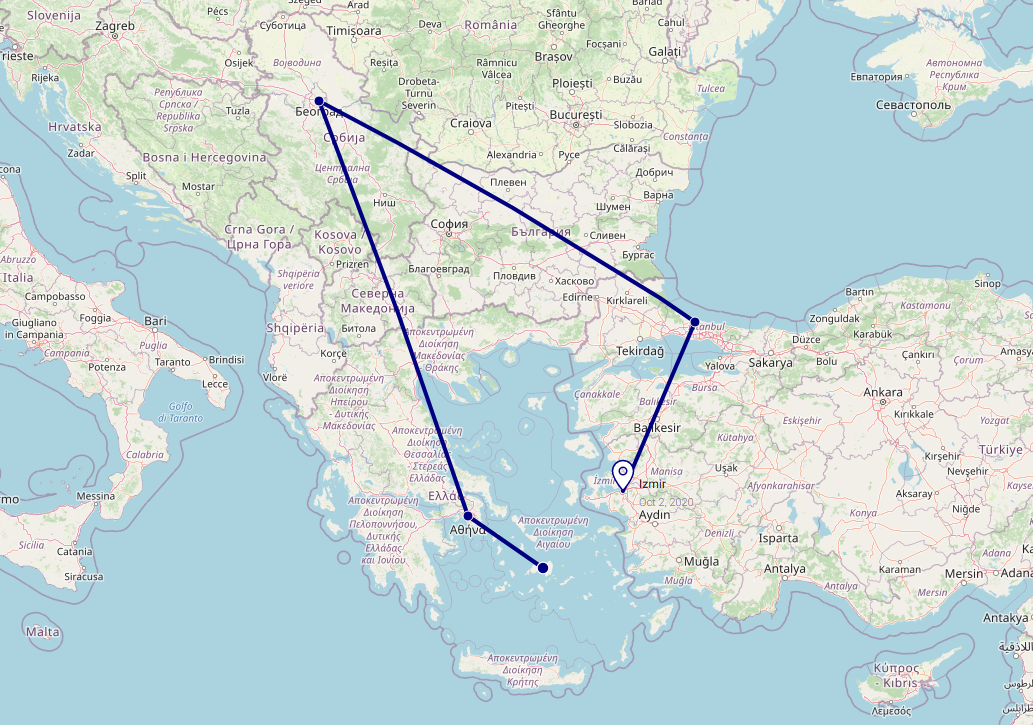
To end this logistics side note, and at the risk of repeating myself: everything that involves borders is more complicated during the coronavirus pandemic. That’s truly the only negative takeaway we had from our entire trip; we’ll tell you more about that. Staying in one country is a lot simpler, exceptionally.
So we also took 3 domestic flights, since they’re cheap in Turkey (that hasn’t changed). Not quite European-ultra-low-cost-carrier cheap, but you can basically go from any major city to anywhere for C$50, and even less between the biggest cities.
All 3 flights were almost full, so that was a change compared to the transatlantic flight. But for the many reasons we’ve talked about before, we still felt very comfortable given how low the risk is on a plane (“infinitesimally small” according to Canada’s Transport Minister himself).
Masks were mandatory on Turkish flights, just like they were on every one of the 12 flights I took that month in 5 countries. Most airlines gave a hygiene kit like the one we showed you in our post about our Air Canada flights.
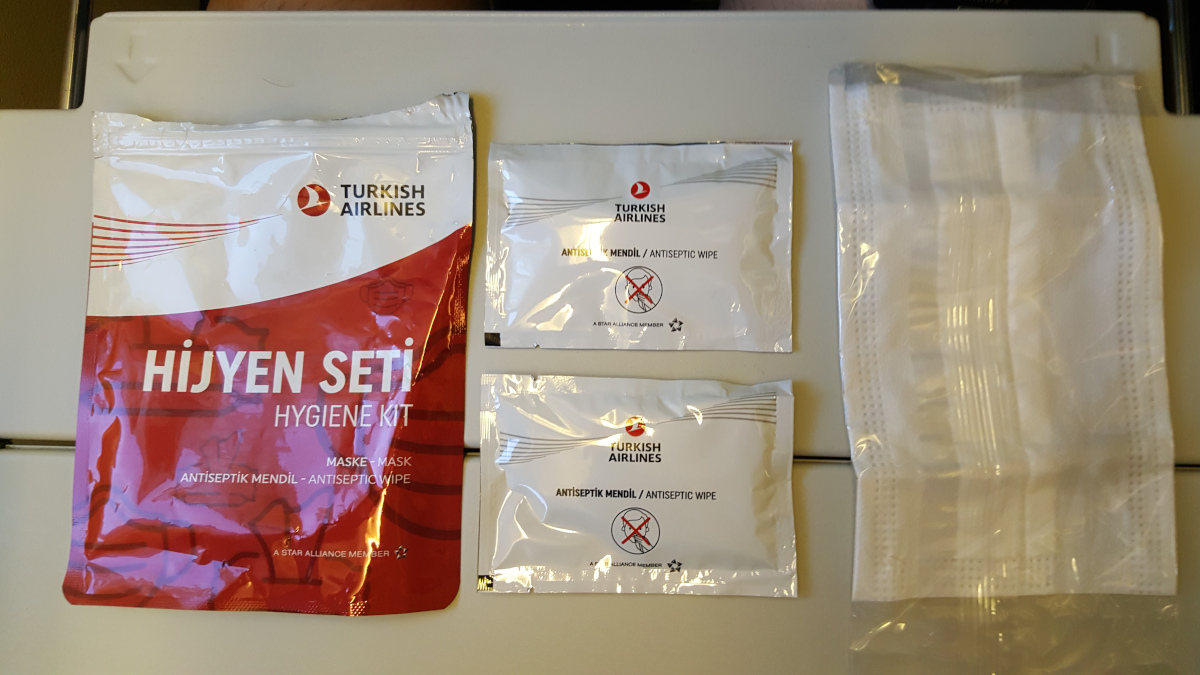
We’ll review each airline separately and tell you about our return flight across the Atlantic on Air Canada.
Now, the Turkish airports. The measures were very similar to those in Canadian airports.
Signs to remind us of distancing were everywhere in Turkish airports, so much so that they spray-painted directly onto the brand-new escalators in the brand-new Istanbul Airport.
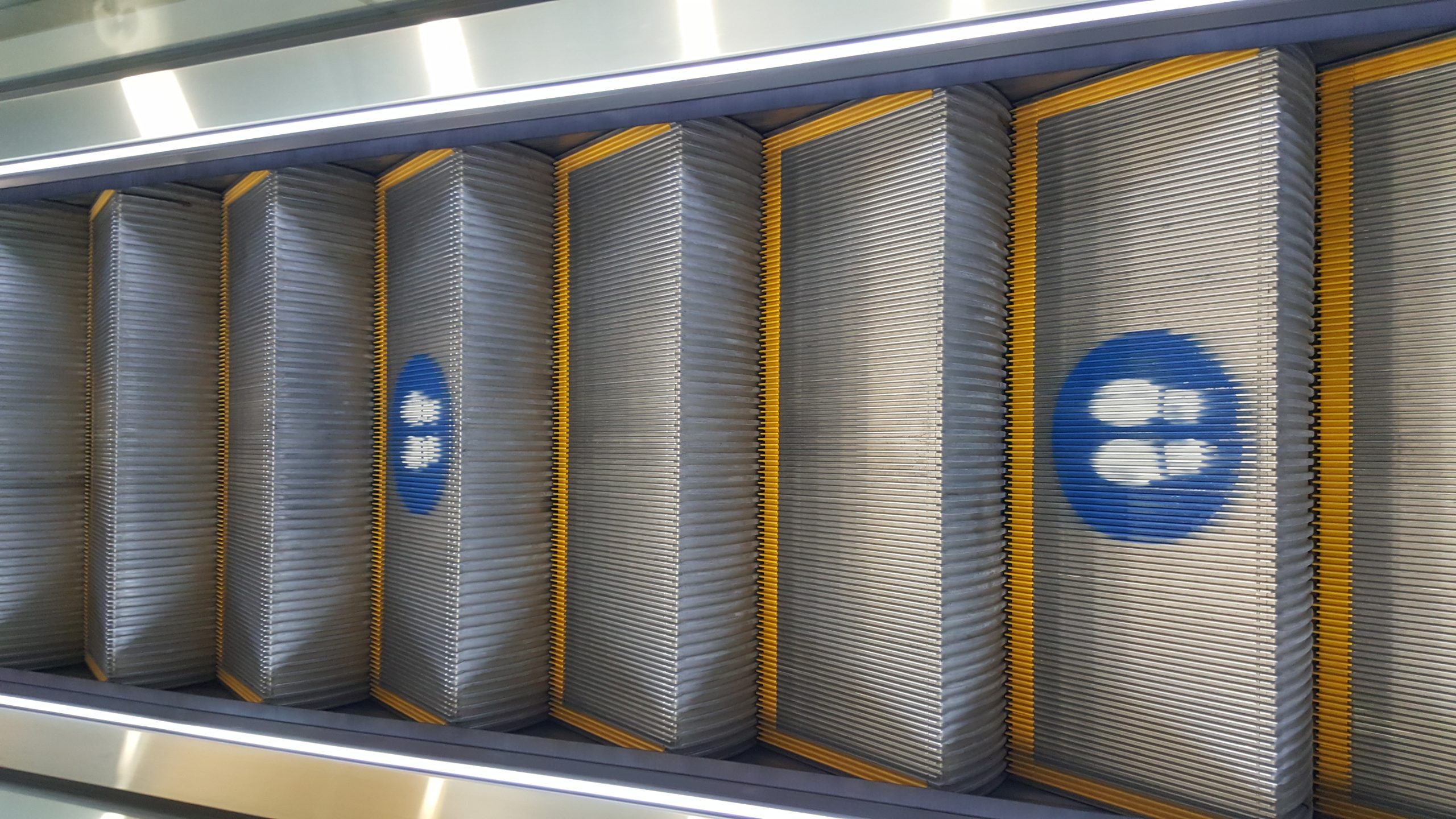
I hope that washes away easily after all this.
Many airport lounges were open, with the same rules as the one I visited in March when returning to Canada at the beginning of the pandemic: food/beverages served by an employee, packaged snacks, blocked seats, and a lot of disinfection.
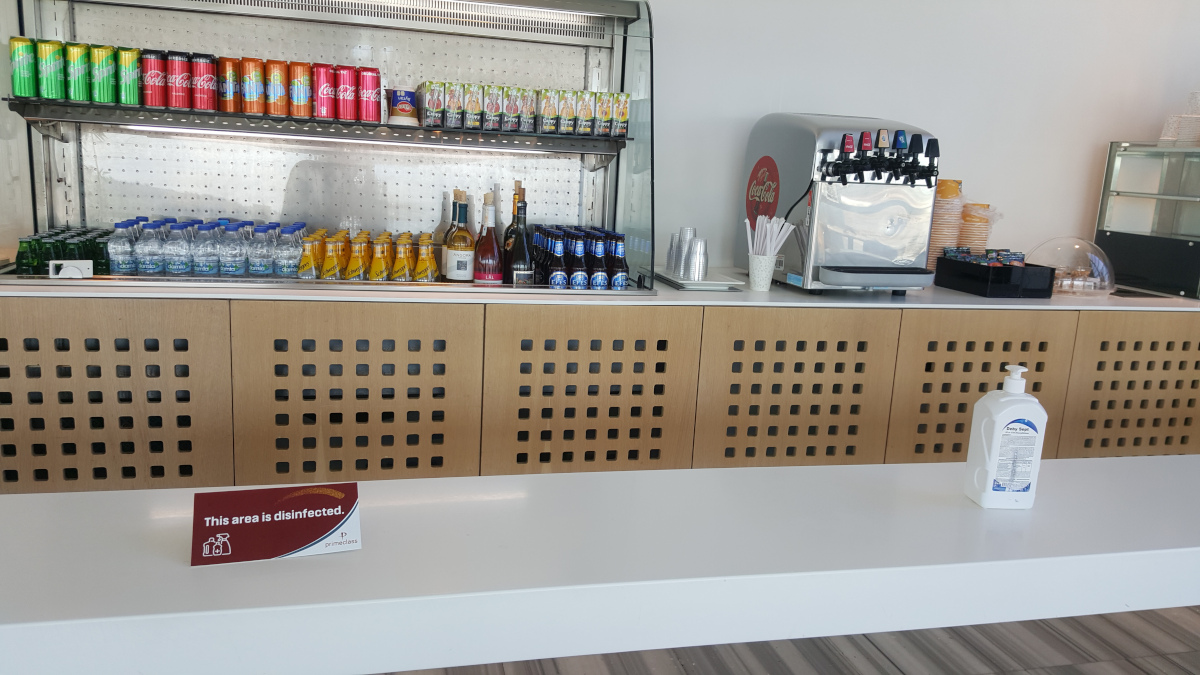
Do not look at this photo if you don’t like plastic.
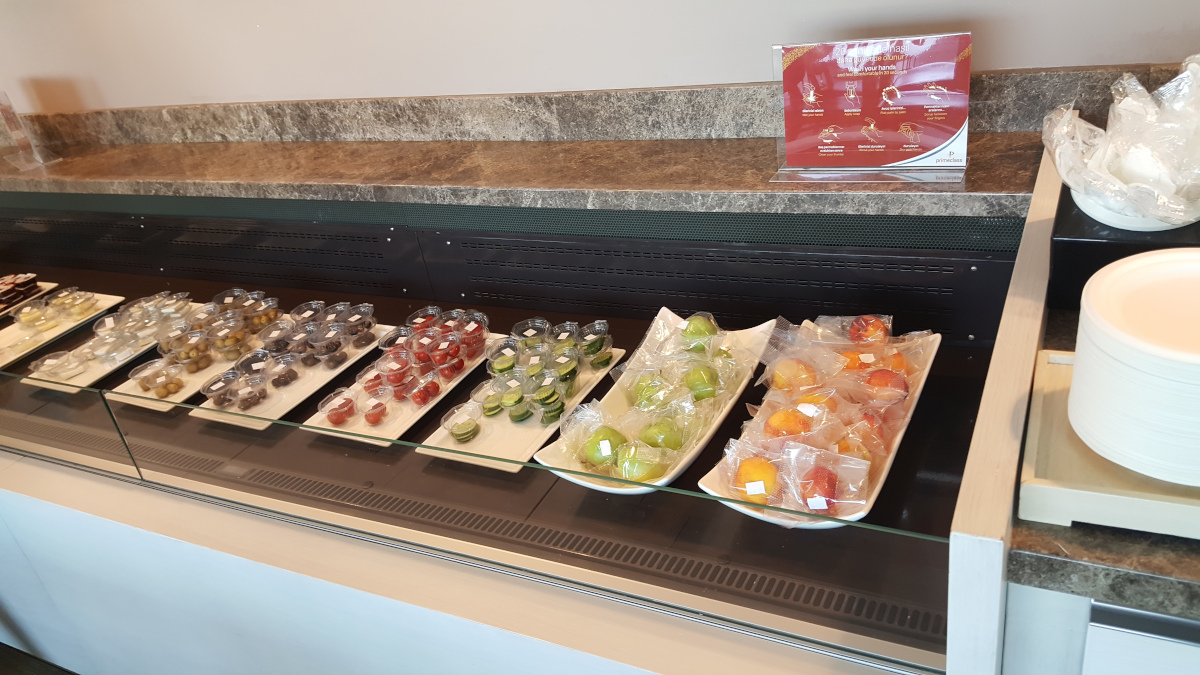
They even had bins specifically to discard protective equipment.
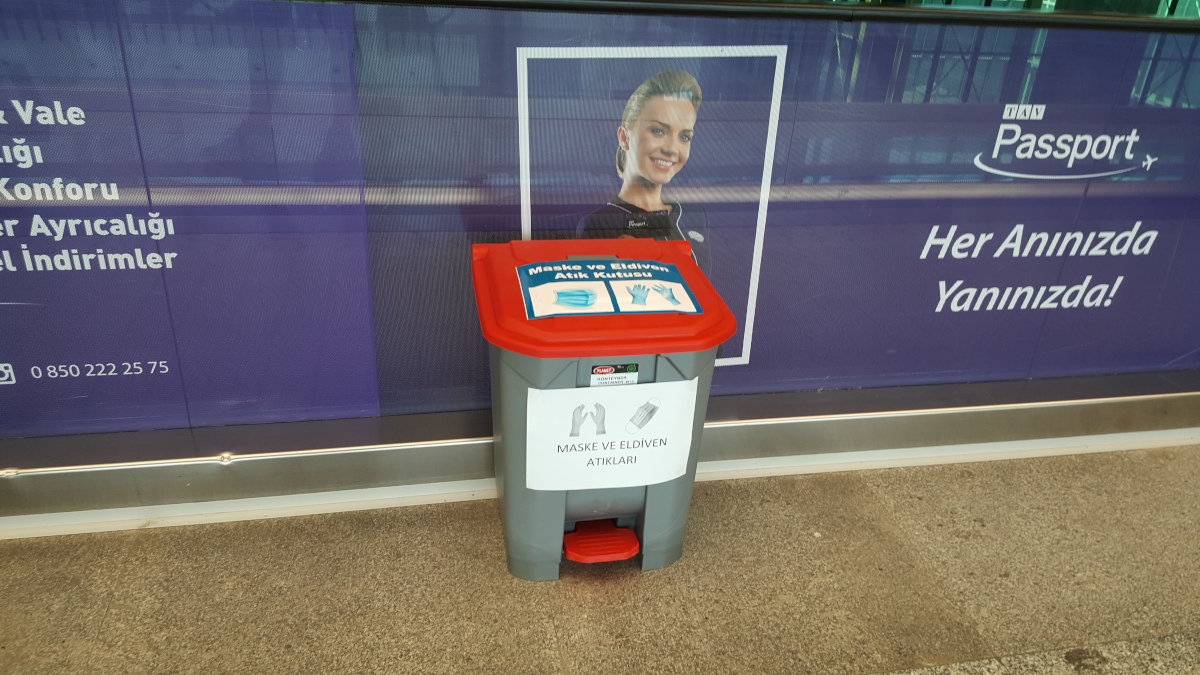
The boarding process was pretty unchanged and airport employees had a protective screen.
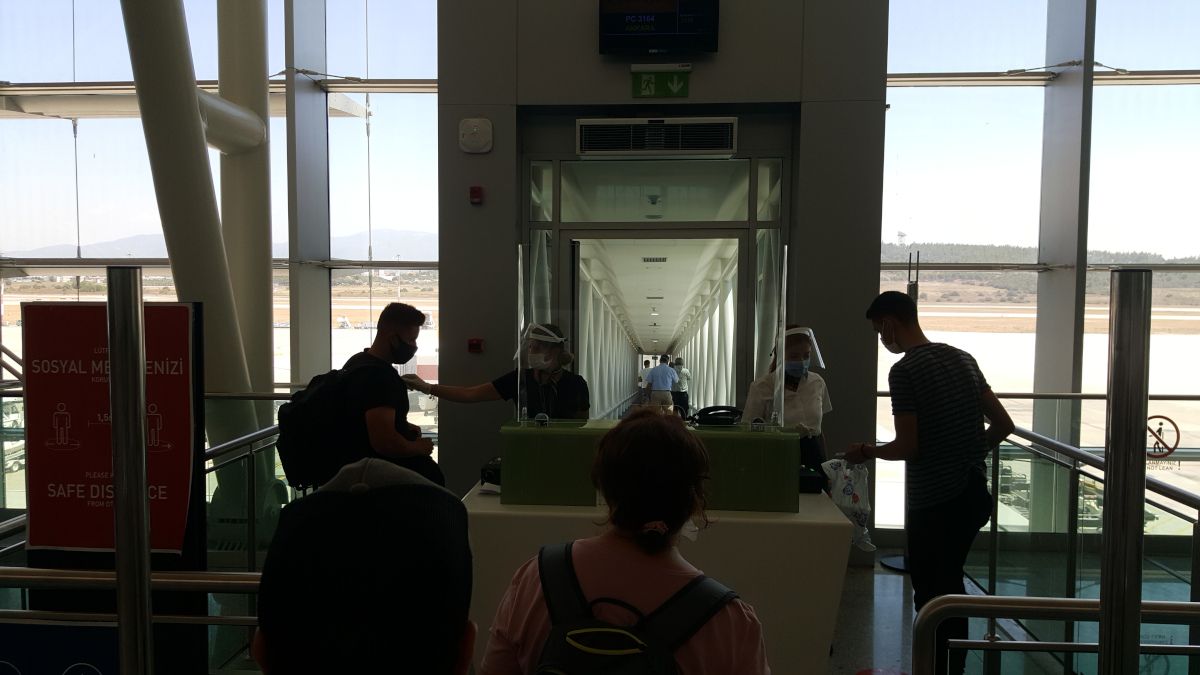
Finally, even in the transfer buses to get from the terminal to the plane (that are widely-used outside of North America) they had the distancing markings.

I’d be surprised if they really follow those since these buses are usually packed full to facilitate the inefficient logistics of bussing passengers to the planes quickly.
But we only had one of these during our trip (with regular gates being more available with the reduced flights) and since we almost missed our flight and were the last ones to board, that was our own private VIP transfer bus and there was no physical distance to maintain.
What it was like in terms of budget
It’s worth repeating once again so that people stop believing the myth that travel has to be expensive: the best way to travel more is to choose countries that have a low cost of living.
Like Turkey.
I said this joke about refunds before, but the best way to make sure you’re not owed $5,000 per person by a travel provider… is to not spend $5,000 on a trip. Added bonus: you’ll travel at least twice as often too!
But seriously, we could’ve spent 3 weeks in Greece, but that’s definitely not a recipe to go on 12 international trips like I did in 2019. I obviously won’t match that total this year, but going to Turkey probably cut our budget in half and will leave me more money for the many, many trips I plan on going on as soon as more countries reopen (or back to Turkey in November).
Anyway, on my two previous trips to Turkey, I was able to come in at under C$30 total per day. I haven’t done the math for this one yet, but it was probably quite similar (although we did move around more… and staying longer in every spot is the way to travel for less).
I’ll have more on this topic in a thorough separate post, but in short, the coronavirus actually made everything cheaper in already-cheap Turkey: their currency has crashed quite badly since March.
That obviously has terrible consequences for locals, but is objectively very good for us as visitors. Once again, supporting locals who depend on travel dollars to make a living is one of the great reasons why travel has to return (safely and responsibly) as soon as possible.
As a teaser, Turkey’s answer to Greece’s €3 gyros, the tavuk dürüm, costs about C$2 in most restaurants.

Our 1-hour bus ride between two cities in a modern coach cost us C$3 AND a flight bus attendant served us a cup of ice cream and a small water bottle.
(Which were included in that price of course.)

One of our Hilton hotels cost C$17 per person (C$34) per night. Our non-chain hotel in a prime location in the capital city of Ankara cost us C$14 per person (C$28). And if you are traveling solo and visiting Istanbul, one of my favorite cities in the world, you can even find well-rated hostels for €5 per night (which is ≈ C$8).
You get the point (hopefully): that is what a cheap country is like. I can’t count how many times someone has told me they paid C$60 for a hotel and thought that was cheap.
It’s not. Turkey is cheap. Anywhere you have to spend over C$30 total per day per person (which you can easily achieve in dozens of countries by following budget travel tips) is not cheap.
Turkey has a completely different vibe that will get you out of your comfort zone on a minimal budget. And if you enjoy luxury, this is definitely a great country to get some at a very low price.
And it’s worth mentioning that despite the low prices, Turkish hospitality is very hard to beat… ask anyone who has ever been!
What it was like in hotels/hostels
We’ll also go over this in a detailed post, but in Turkey we tried both chain hotels and non-chain hotels to see what it was like.
In the Greece article, I mentioned how chain hotels have a clear edge in these times in terms of hygiene…
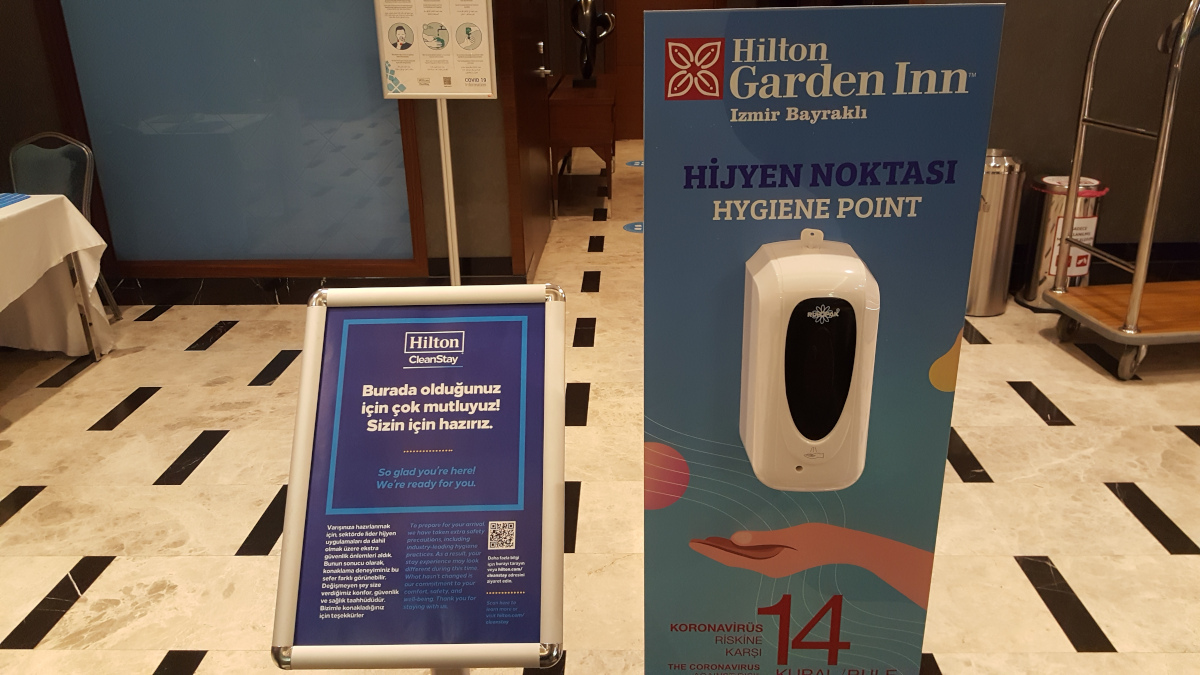
But Turkey might actually be one of the only places where that is less true. The aforementioned “Safe Tourism Certificate” is available to all Turkish hotels.
Both independent hotels we went to had the certification and had thorough measures like temperature checks, health questionnaires, hand sanitizer, and many more behind-the-scenes requirements to keep travelers safe. Their certification notably involves a monthly formal inspection and also some secret inspections too.
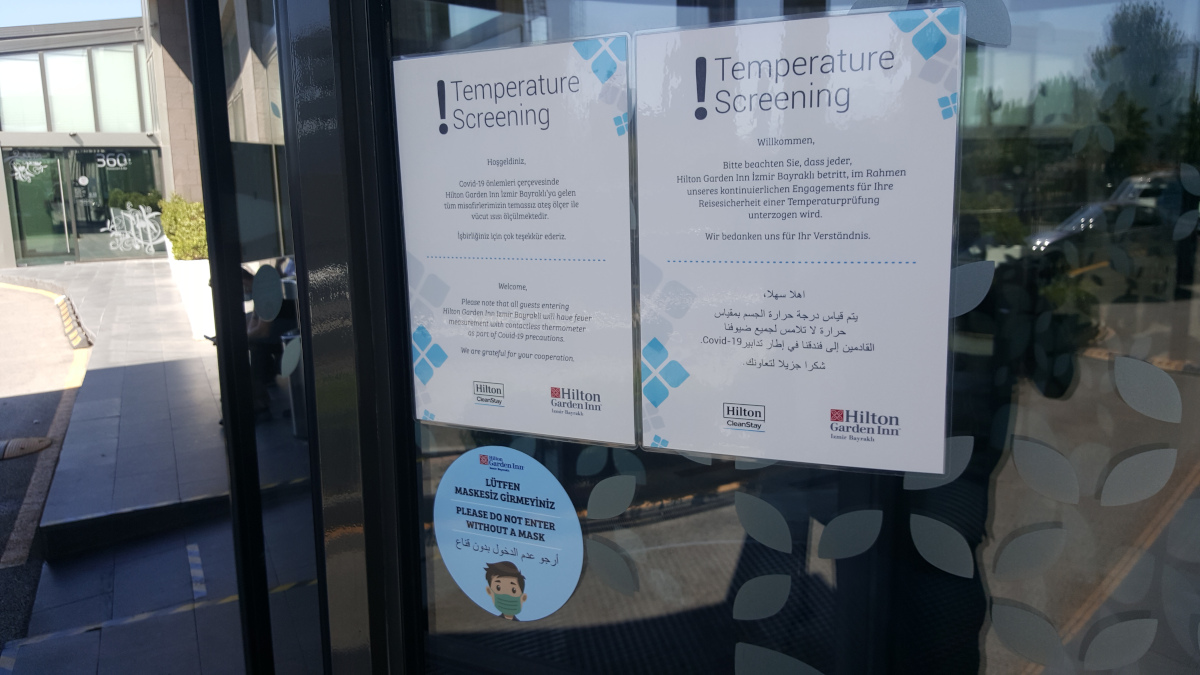
And the 5 different Hilton hotels we stayed at in the country were obviously all a top-notch experience in terms of health measures, and they all followed the chain-wide standards.
Like all other major chains, Hilton has its own in-house hygiene protocol, which includes sealing the room after it has been cleaned.

(We’ve talked about getting free hotel nights with Marriott many times, but it is also possible with Hilton and the deal is just as great. It’s just that it’s basically only available in Turkey, while Marriott can give you many free nights in a wide variety of destinations—we’ll talk more about how to get Hilton points soon.)
Distancing was encouraged in elevators.

Some hotels even went above and beyond the standard protocols, by wrapping towels.

Or by wrapping the remote control (proven to be the dirtiest thing in a hotel room, at least pre-pandemic).

Even pens are sanitized. Hotels have never been cleaner than they are now!
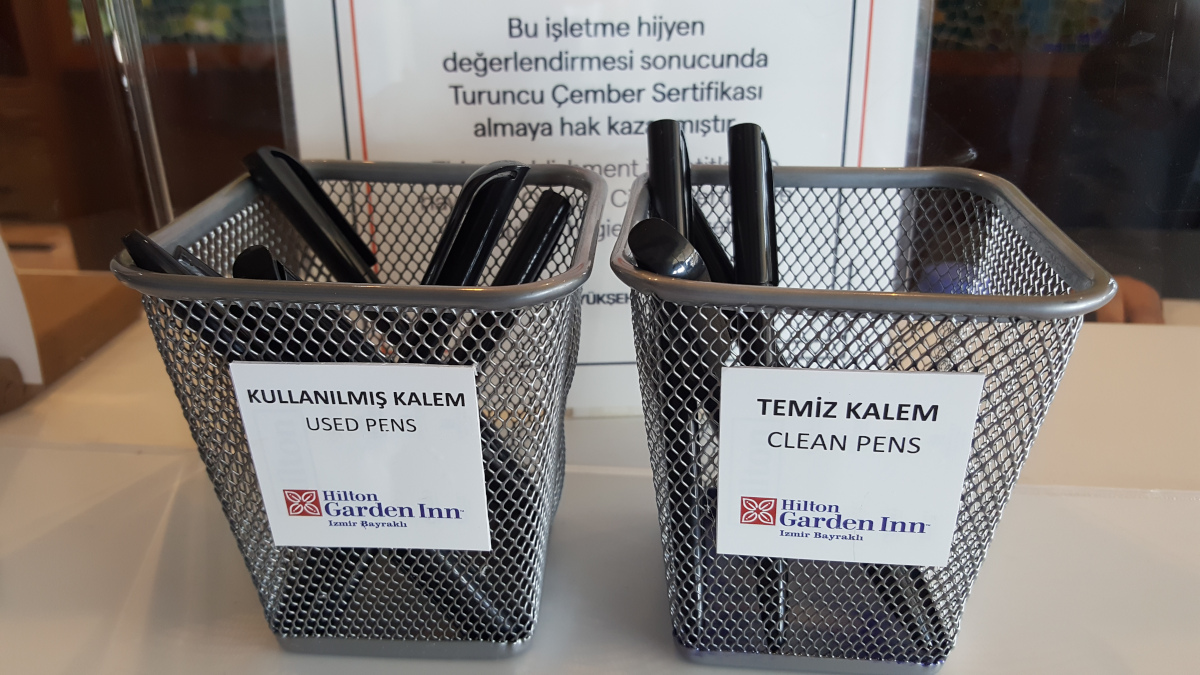
One element we didn’t mention in the Greece article, since the main concern for many remains health, is a very “first-world problem” issue, but it’s definitely worth mentioning: how some services or amenities aren’t available “because of the coronavirus”. Note the quotation marks.
It’s nothing dramatic. Like most travelers, we don’t go somewhere to stay locked inside a hotel. But it’s something to at least consider when choosing a hotel. It’s only a matter of time before some hotel chains decide to differentiate by safely offering their full slate of amenities.
In fact, it will even be every hotel at an individual level, another example of what we keep saying: it’s the preparation part of the trip that has mostly changed. We’ll talk more about this, including for Marriott specifically, as they’ve launched a new way to check every hotel’s coronavirus closures and impacts.
Anyway, this is especially impactful for those who have an elite status like us or for those who really are more vacationer-luxury-hotel-lovers who value the hotel experience as much (or even more) as actually leaving the hotel and visiting new places, it’s true that some details aren’t necessarily back to normal.
In Turkey, all hotel gyms and restaurants were open, but for example, hot breakfast options were often more limited than usual. In one instance, a hotel’s very large rooftop terrace was closed due to the coronavirus… your guess is as good as mine as to how the coronavirus makes it more dangerous to be outside on an open-air terrace than inside in a less-ventilated lobby…
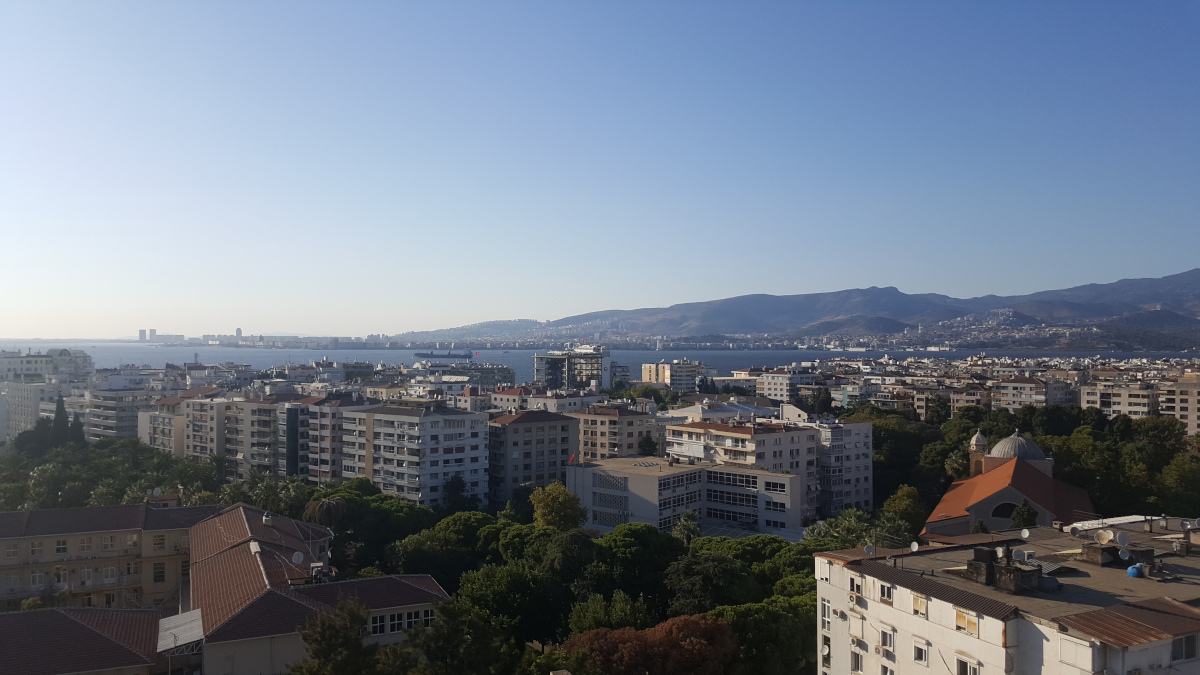
The truth is, some hotels are simply taking advantage of the coronavirus to make the experience slightly less enjoyable… to cut costs.
For example, we stayed in 2 different DoubleTrees, Hilton’s brand known for giving you a warm chocolate cookie at check-in (it’s their claim to fame; many of their hotel shuttles have a huge cookie painted on them). At one of them, we got our cookie… but at the other one, the coronavirus made it too dangerous to give us a cookie. Oh, and these two DoubleTrees were in the very same city, so it’s not that the situation/rules in the area were different.

One last example: one thing we enjoy as elites is having access to hotel lounges (many full-service hotels have these), but lounges are mostly closed now. Again, there’s no chance it’s more dangerous to give us food and drinks in a hotel lounge compared to doing so in a hotel restaurant. The difference is just that the food and drinks in the lounges are free and hotels can save money by closing the lounge.
What it was like for rental cars/taxis/buses/trains/subways
We tried almost everything there was to try in terms of transportation to give you a complete review of the situation soon.
The short version is that masks were mandatory everywhere, and that’s pretty much it.
We took a long-distance train on Turkey’s high-speed YHT, and that was by far the best way to move around.

For less than C$7 we had very comfortable seats for our ≈ 250-kilometer journey.
One that took just an hour and a half as the train reaches speeds up to 250 km/h, putting VIA Rail to shame.
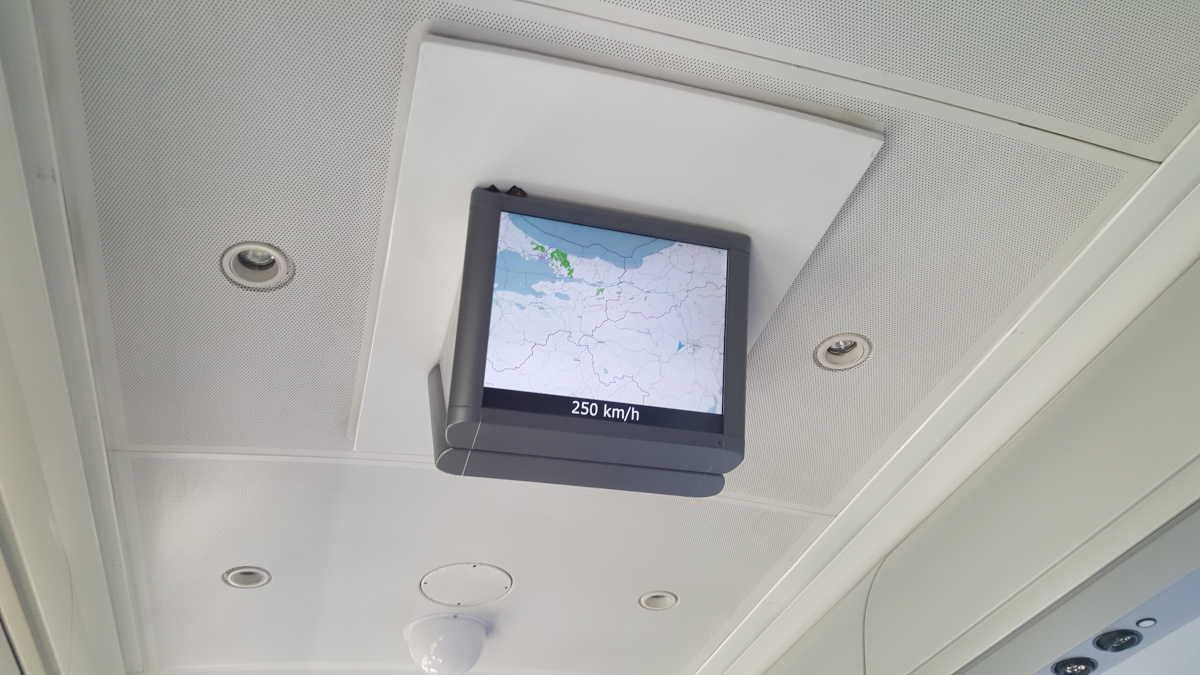
They blocked every second seat, so there was no chance of having someone next to you. Weirdly, even if you booked 2 tickets, they still don’t seat you together (which means train tickets sell out faster than usual, as we can attest to).
We also took 2 long-distance bus rides, and Turkey’s bus experience is simply phenomenal, as it was on my 2 previous visits, as I alluded to in the budget section. Buses did not block seats for distancing, however.
But they did have hand sanitizer, like everywhere else!
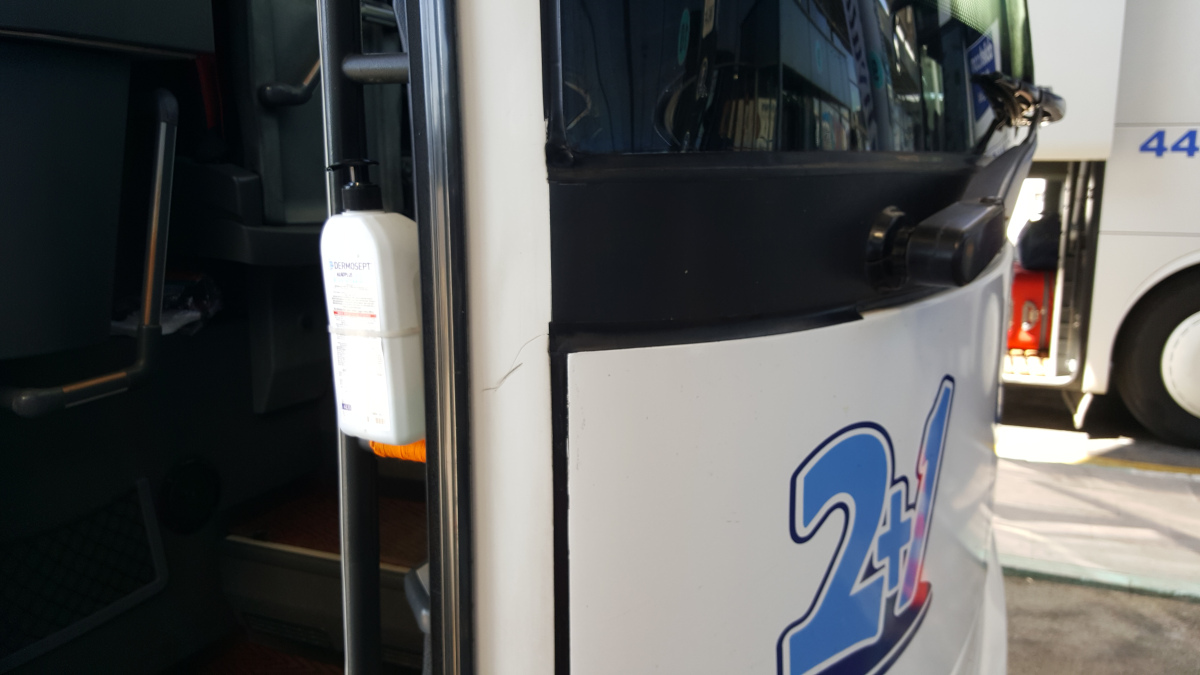
We also took the affordable airport transfer buses that are available at all Turkish airports (often called Havaş, but not always).
These did not have blocked seats either.
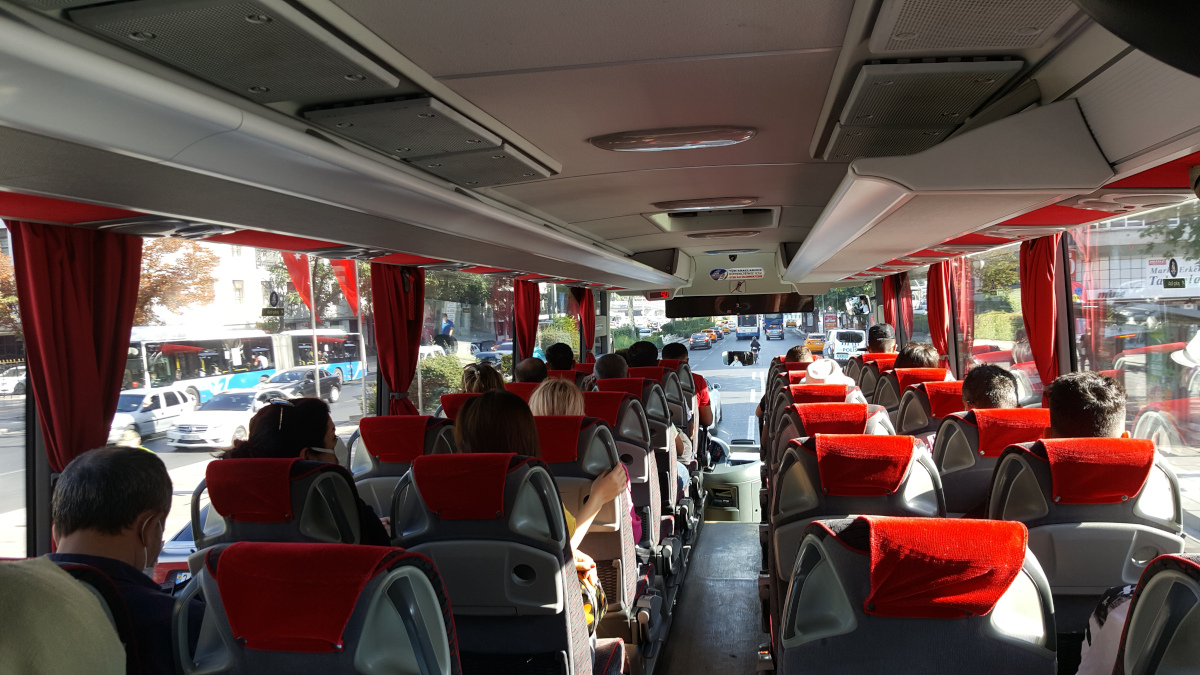
Within cities, we took commuter trains, subways, and local buses. You can sometimes pay for these by tapping your credit card, unlike the 1980s-worthy method we have in our so-called “developed” country.
Hopefully, the contactless trend that the pandemic has brought about will at least have the benefit of helping to finish off archaic cash payments.
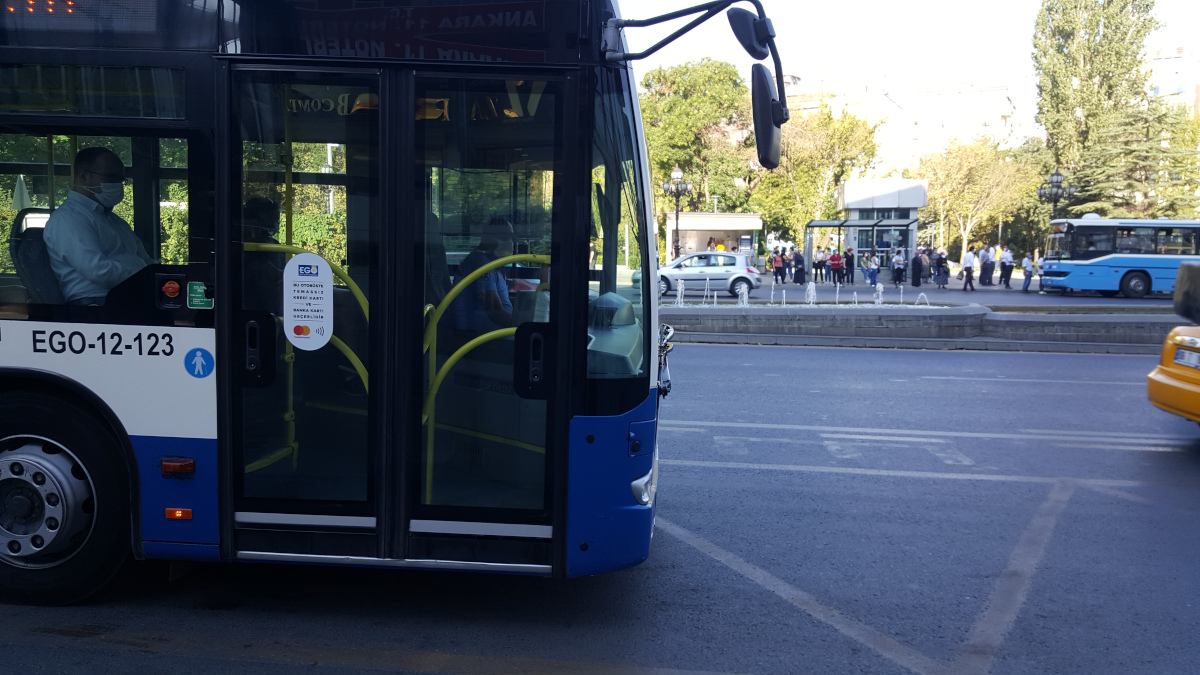
And it was easy enough to keep physical distance in urban transit by simply avoiding rush hour, at least the times we were there.

We opted for a car rental for a few days to explore the Aegean region since we had never roadtripped in Turkey.
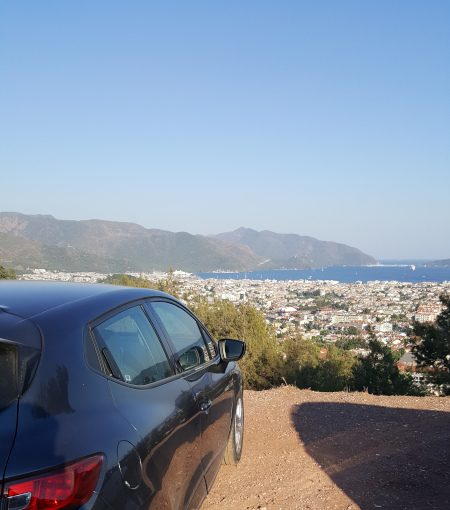
While we always book with an online comparison tool as everyone should always do, we always choose major international car rental companies to avoid one of the most common travel scams (being forced to pay for rental car insurance—my credit card insurance for rental cars was valid despite the pandemic, but double-check for your card).
Major international car rental companies all have worldwide disinfection and hygiene protocols that made us very comfortable renting a car and again, not much has changed in terms of car rentals. Budget was the cheapest for our dates, but of course that changes every single day.

Finally, the #1 rule of budget-travel in terms of transportation is pretty simple: it is usually to avoid taxis and Ubers.
But when you’re not traveling solo and you are in a cheap country, sometimes the additional cost can be very low. Taxis in Turkey are very cheap, and I’ve never had an issue with them not trying to not use the meter, so you’re never getting the 200%-higher tourist price.
Drivers had masks and were as friendly as they could possibly be without speaking English.
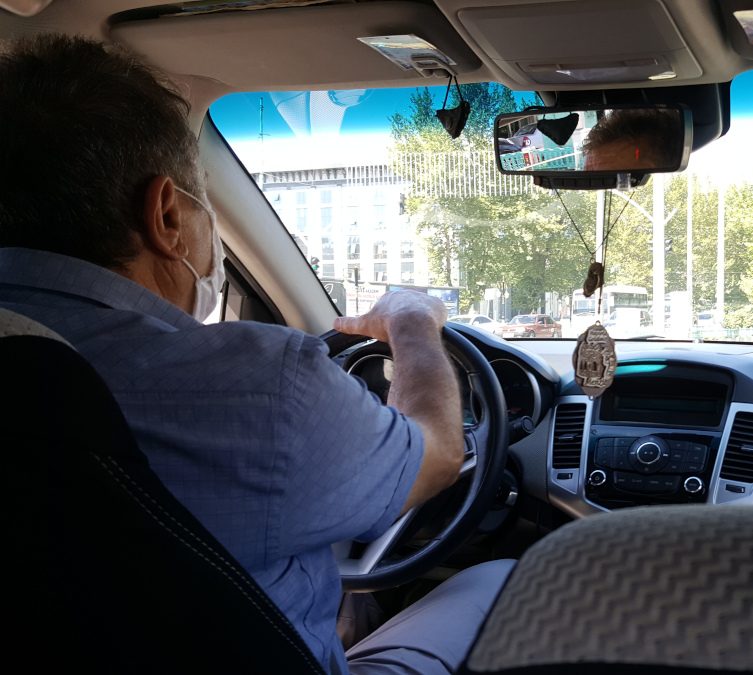
What it was like to book and plan the trip
I gave you a glimpse of this in my side note about finding flights earlier, but this is where there were basically the only negative aspects of this trip for us.
We were supposed to fly back from Athens to Canada, but given how much more expensive than usual it was to fly between Turkey to Greece, we used Air Canada’s free change policy to change our return from London instead. Even though it’s much further away from Turkey, it was a lot cheaper to fly to the UK than to Greece. Plans change during the pandemic!
And as opposed to what we normally love (adding a stopover in a new city), we had to find flights to the UK that were nonstop. Because while many European countries allow Canadians in, some allow Canadians in only if you arrive from Canada or another European Union country. So figuring out which countries among the affordable options allowed transits from Turkey was a headache, even for us.
Finally, apart from the issue of traveling between two countries, even within Turkey we had to completely change our itinerary. We never book anything ahead anyway, even before the pandemic, so the change wasn’t really an inconvenience at all. But realizing that the coronavirus hotspot was in the Kurdistan region, we decided to modify that part of the itinerary I had shared with you initially, out of an abundance of caution. Plans change!
So anyway, I’ll write the same thing as I did in the last article:
This is a significant topic that will also require a thorough separate part to come soon, because it’s really what has changed the most about traveling during the pandemic, given how unchanged the travel experience itself is.
Want to get more content about the new reality of travel?
Summary
Travel to Turkey during the coronavirus pandemic was not that different than it was before, honestly. Definitely a pleasant experience, at least once we were there. If you choose the right destinations and take the right precautions, the main negative impact of the coronavirus pandemic is really noticeable only on the preparation, planning, and booking portion of a trip—not the trip itself.
What do you want to know about travel to Turkey during the pandemic? Tell us in the comments below.
Explore awesome destinations: travel inspiration
Learn pro tricks: travel tips
Discover free travel: travel rewards
Featured image: Blue Lagoon in Ölüdeniz (photo credit: Andrew, Flytrippers co-founder)
Advertiser Disclosure: In the interest of transparency, Flytrippers may receive a commission on links featured in this post, at no cost to you. Thank you for using our links to support us for free, we appreciate it! You allow us to keep finding the best travel deals for free and to keep offering interesting content for free. Since we care deeply about our mission to help travelers and our reputation and credibility prevail over everything, we will NEVER recommend a product or service that we do not believe in or that we do not use ourselves, and we will never give any third-party any control whatsoever on our content. For more information on our advertiser disclosure, click here.

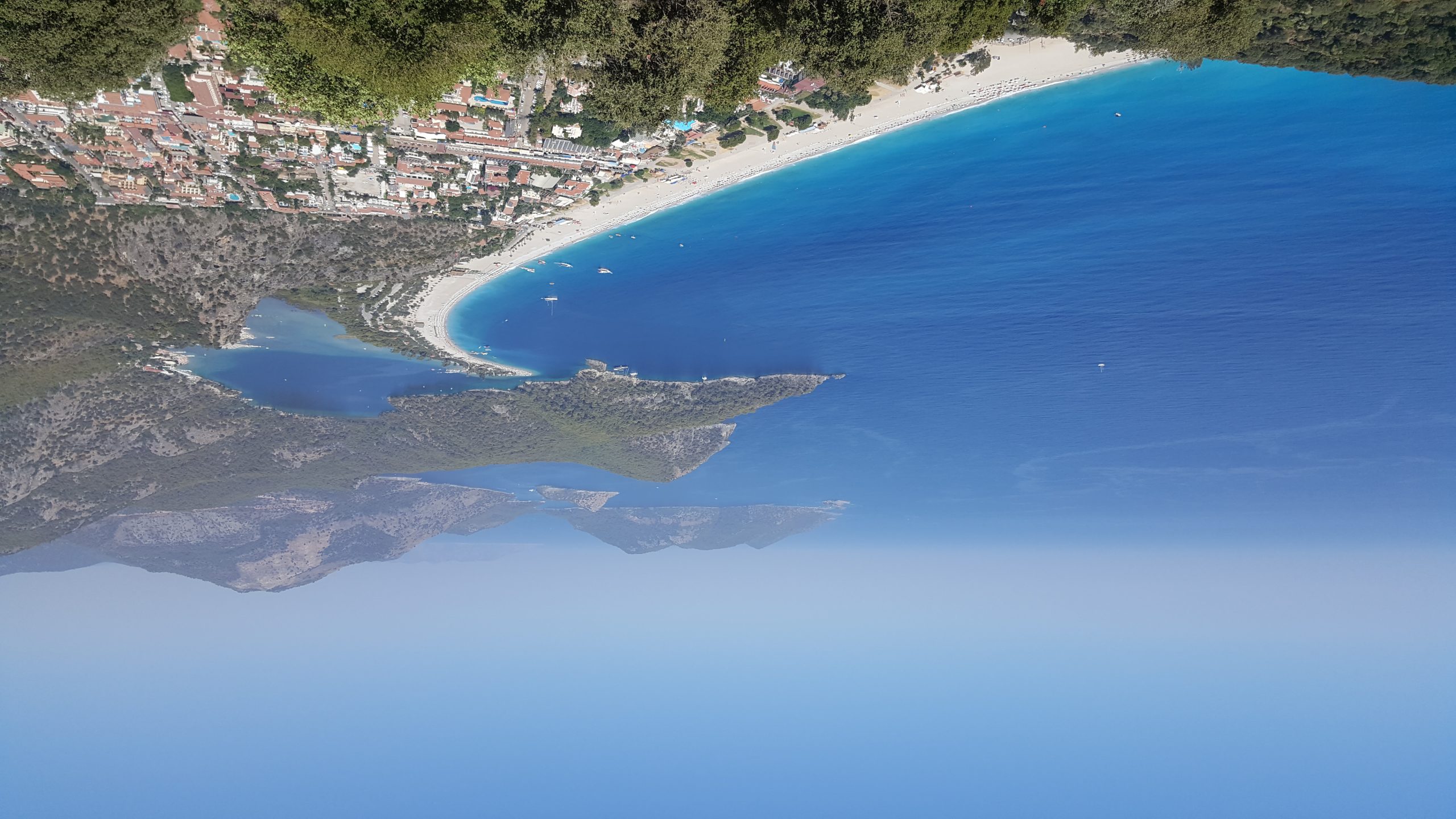

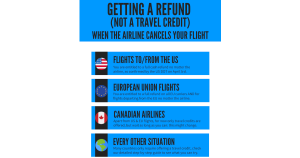

I appreciate your Travel To Turkey article post, Andrew. I look forward to your new informative travel blog posts.